#discourse feels like a weak word to describe it but even so
Explore tagged Tumblr posts
Note
I know fans using the term Logomancy to refer to her backward magic, but I felt like there's more meaning to the title itself. The suffix "-mancy" actually refers to divination and prophecy. Therefore, any word ending in "-mancy" describes a form of divination, such as cartomamcy, which uses cards or tasseomancy, which uses tea leaves. So, Logomancy here basically means divination using words.
Just some thoughts about this! Also, I felt like only speaking backward to do magic is quite limiting to the term. Consider my interpretation, Logomancy could do much more like for example, with word play and riddles and stuff, IMO.
Okay so I have lots have thoughts about all this. I have a farfetched explanation for the logomancy, i don’t think backwards speaking is limiting, and she has cast spells lots of different ways in the past, so let’s get into it!
So with the mancy thing, I think it’s really funny/interesting how any type of mancer has come to mean that’s the type of powers they have as opposed to meaning divination. Like across all modern fantasy media everyone knows necromancers as people who raise the dead and have death magic powers. I do kinda wish it would go back but, not
With Zatanna i like that it’s called Logomancy because it’s a pretty unique type. Not many other characters are referred to a logomancer. It sounds cool, it’s camp lol. But you can kinda make it fit as “divination” because everything she says backwards comes true. So you can almost classify her spells as predictions that just immediately come true. It is a stretch but it’s technically true. She also does have the power to see the future and can do tarot so she can canonically divine with her magic, which helps it be defined as a divinatory power lol.
And she has cast spells with rhymes, through song, palindromes, runes, she’s done a whole lot.
Moving on to logomancy being limiting, and sorry this will get a bit ranty but I disagree. There’s this weird discourse around Zatanna speaking backwards to do magic and this idea that because she speaks it’s not practical, or that it means other magic users have an advantage of some kind. Which just isn’t true, and even if it were I think people forget that supeheroes are inherently impractical. They’re all a little silly, a little campy, it’s entertainment and we don’t need to logic our way around speaking backwards to cast spells.
And I’ve noticed characters with vocal powers in particular catch a lot of flack, “they need to use their voice/mouth” as if super strength doesn’t require muscle, or speedsters don’t need legs, or green lanterns don’t need appendages, or that psychics need brains, etc. All of them need something to use their powers, yet Zatanna and vocal heroes get treated like it’s a weakness which goes back to her powers being constantly disrespected.
Yes, Zatanna can do magic without speaking, but I don’t think that should be the norm,and I don’t want her doing nonverbal magic more than her backwards spells. She shouldn’t have to do nonverbal magic in order for her to be taken seriously or not be treated as a threat and powerful. And I feel that these discussions about having to prove she can do magic without talking shouldn’t really be a discussion. Logomancy is as old as Superman, it’s a tradition as old as DC’s premier Superhero and I’m tired of pretending that she’s somehow limited by using it.
Writers constantly gag her to depower her and if we want to talk practically it’s actually so difficult to prevent someone from speaking. And even if it weren’t, Zatanna is one of the top escape artists in DC continuity. Her Batman and Mr Miracle are the trinity of escapology, and we’re saying rope and duct tape can hinder her? And if it really were her weakness she could very easily take precautions to prevent that from happening. And then all of that is moot because she really can do magic without speaking and does it all the time.
It’s just frustrating because there’s so much to unpack with the discussion and so much history to disprove it. That’s the end of the rant part lol
Sknaht rof eht ksa!
11 notes
·
View notes
Text

@textilesimp sorry for the late reply, and this isn't necessarily a coherent, fleshed out theory, but the jist of what leads me to think that is:
So, basically, the gender binary creates two boxes with a set of established interests and personality traits, right? Boys like dinosaurs and toolboxes and fixing things, girls like playing house and romance and flowers. Boys are irresponsible, carefree and rambunctious, girls are sweet and nurturing and sensitive, etc.
And there are studies that show that a baby crying will be interpreted differently depending on if the baby is thought to be a boy (he's angry!) or a girl (she's afraid!).
You also see a lot of this in new age / pop culture spirituality, where the terms "divine masculine" (read: avoidant attachment style) and "divine feminine" (read: anxious attachment style) were literally everywhere for a while, and even people who don't talk about dm/df dynamics will still default to using "masculine energy" to describe what is probably better understood as yang energy (active, loud, controlling and forceful), and "feminine energy" to describe passive energy that's more nurturing and yin like. Part of this is because there was discourse over whether yang/yin energy is vocabulary that people who aren't East Asian should get to use, but it's also kind of weird to me that when we run into the same concept in western esoterism, the closest words we have are masculine/feminine??? And even people who otherwise don't fuck with the gender binary struggle to describe these to opposite ends of A Spectrum in anything other than masculine vs feminine. (Interesting to note: some alchemist practices do acknowledge androgyny and hold it up as the ideal; in addition, Mercury (and I believe Hermes but don't quote me) was portrayed as hermaphroditic in ancient Rome).
So we have a lot of other concepts just kind of umbrella'd under the gender binary for ???? reasons??? but because of that I think we genuinely end up with a cultural bias towards seeing masculine/feminine as actual personality traits, and then when you throw in the fact that we're increasingly isolated, and there's like, a loneliness epidemic (even outside of the "male loneliness epidemic", like, IDK why we suddenly switched to putting "male" in front of that, except, I guess, that men-as-a-monolith have been exploring vulnerability while women-as-monolith have been exploring a fear of vulnerability, like, en masse?? IDK straight culture is wild and this is a tangent.)
And I think because of this, you end up with parents who already feel isolated from their children clinging to the child's assigned sex as some sort of concrete guarantee of who that child is. Especially in authoritarian circles where emotional connection & vulnerability is seen as dangerous or weak, and where, quite frankly, people put a lot of energy into not thinking about things Too Much. And it carries over into adulthood too -- we have "For Him" and "For Her" displays in department stores for a reason, and I think that reason is because a lot of people don't actually know their partners as well as they maybe should? Because who has time or energy for that between bills & kid & work.
Anyway, this is mostly rambling, but . . . I do kind of think that the gender binary exists because people are forgetting how to connect with other people.
Honestly, I think the gender binary exists primarilly to create the illusion of intimacy and no other reason.
4 notes
·
View notes
Text
portrait of a blank slate. huang renjun

pairing: huang renjun x fem! reader genre: college au. fluff, smut, and the tiniest bit of angst. warnings: swearing, alcohol, angry man renjun, very bad dialogue, this is the most un-renjun fic i've ever written, dry humping, a heavy makeout session, unfinished blowjob word count: 5.8k playlist: no specific one this time but i listened to a lot of keshi while writing this, so have this playlist of mine to fit the vibes a/n: inspired by that one tweet describing how someone's art professor met his wife the same exact way, lost the screenshot and also the og post im so sorry!
turns out all it takes to save a life is a bad, bad college party, a few shots and a weird, magical coincidence back in a girl's dorm room.

It’s hard to believe that Huang Renjun is currently finishing up the art portfolio he needs for his summer internship program after procrastinating and angrily stomping at every single bad stroke of his paintbrush for the last few months.
Because he’s not.
He’s looking at the canvas with stern eyes, the smudges on the white linen so messy he could cry just by looking at them, and the more he tries to save the disgrace currently scribbled in front of him, the worse it gets and makes the levels of frustration in him turn into rage and fury, because let’s be honest– what is Renjun’s primary emotion if not anger.
And he tries hard to fix it again, he really does– he sighs heavily while doing so as he takes a smaller brush and tries to paint on a few hairstrokes to the portrait of Frida Kahlo he wants to execute– and in honest reality, it doesn’t even look half as bad as it does in the poor boy’s eyes when he takes a step back after holding in his breath and carefully piercing together the artwork. Maybe if there was someone else in the room– everyone but his annoying roommate Donghyuck, because that fucker always manages to make things even worse– they could talk him out of it, offer some words of consolidation, even, hype him up and tell him that with outsider’s eyes, the canvas looks beautiful and very well put together. But the truth is that there’s no one present right now, not a single soul in what feels like the whole campus right now, that could ease Huang Renjun’s frustration from what seems to be art block, when he throws the paintbrush to the wall (he’ll worry about the stain of acrylic paint later, when he gains consciousness) and puts a fist through the middle of the painting.
If he was a character in a comic book, his hand would go through the canvas and create a quite satisfying hole. He’s a real person, though– a weak one as well, to be quite honest– and his fist is stopped by the stretched-out fabric, making his hand bounce back, but now stained with all shades of brown and tan, which somehow only makes him even more mad and turns him into a furious animal roaming around free and causing uttermost chaos in his all true sense.
Nothing can stop Huang Renjun when he opens the drawer he keeps all his artwork in, taking out all the graphite sketches and colored pencil drawings, and then the next one containing the watercolor paintings and various other acrylic paintings done on expensive sheets of paper, stacking all of those onto one pile in the middle of the table. Not one thing is safe– except from the digital artworks he keeps in his iPad and his big A4 sketchbook he forgot about in the heat of the moment, since he keeps it on his nightstand– when he takes the big, heavy stack of art and runs, chimes towards the entrance of his and Donghyuck’s miniature dorm room, luck only standing by his side once in this whole evening when his said roommate opens the door and clears the way for him, looking at the poor boy with mouth agape in a slight shock.
“What the fuck are you doing right n–”
Donghyuck doesn’t get an answer. When he asks stupid questions, Renjun doesn’t tend to pay him much mind, settling on not engaging with the discourse if it doesn’t make much sense, so Hyuck should be used to the ignorance– he thinks this was a very valid question to ask at this moment, though. If he was curious enough, he’d even follow his roommate down the hall and watch him in his endeavors only to find out what’s the intention behind his angry stomping and the fierce look on his face. The truth is, though, he doesn’t care all that much.
That doesn’t stop Huang Renjun, though, as he chimes down the hall of the boy’s dormitory, kicks the glass door open (thankfully not the actual glass part, because that would for sure be expensive) and practically runs the rest of the way towards the bins at the end of the street, dumping the papers into the bin (forgive him for not recycling in his current state of mind) before he angrily kicks the poor object twice for good measure and turns on his heel, slowly, but still as angrily making his way back to his dorm room by stomping all the way up until the entrance.
The dorm guard doesn’t even ask for his dorm ID like he usually does– Renjun must have been quite memorable as he ran out of the building with 5kg of artwork of various sizes in his arms– but the truth is, the man isn’t as old and he saw the boy going out just a few minutes ago, so he doesn’t think it’s necessary. Renjun would appreciate the memo, although, when he remembers that the man always asks for the dorm ID, especially on the nights out when he comes back slightly intoxicated and too disoriented to look for the little slip of paper in his pockets, and on the nights when he forgets his dorm ID as well– the man was set on letting him sleep on the front porch of the dormitory once and it took Renjun 15 calls to get ahold of a sleeping Donghyuck and another 15 of him walking down the hall in slippers and pajama bottoms with his roommate’s dorm ID in hand before he could warm his bones from the cold slowly seeping into his bones on the January night– and that whole thing makes Renjun somehow even more angry at the whole situation.
And so when he comes into his room again, Donghyuck now sitting on his bed still in his outside clothes (something Renjun hates and would murder for), and his eyes land on the damaged canvas still waiting for him in the corner of the room, he wastes no time in opening his window and throwing it down from the second floor, not really caring where it ends up or if he’s gonna get a fine for violating one of the dormitory rules– to never throw stuff out of the windows..
“Dude, what is–”
“Don’t ask.” Renjun huffs as he closes the door and peels his clothes off, taking a towel that’s still hanging from the top bunk of their bed and aims towards the bathroom door. A true tantrum can only end in a cold shower, and that’s what Renjun’s gonna do as he washes his dreams down the drain and ends up silently crying himself to sleep tonight in agony.

It’s hard to believe Huang Renjun is currently at the best college party since the days of ‘megaparties’ of Johnny Suh, the senior that’s slowly halting his party performance due to stilling in life. Renjun was dragged to Lee Jeno’s party by his roommate Donghyuck after he mourned in his bed for approximately two days before it got too much for the poor gemini, promising and honestly thinking that alcohol is truly the best solution for the poor boy’s misery. Again, it’s hard to believe Huang Renjun is currently at the best college party of the year when he listens to the loud EDM music piercing through his eardrums and he swears he catches a glimpse of a couple dry humping on the couch.
Because he’s not.
He’s at a college party, sure. He’s also getting some alcohol into his system– because why not, am I right? He’s not the one paying, and that’s always enough of a reason to drink. Is it the best college party he’s ever experienced, though? Absolutely not.
It’s quite literally the worst party he’s ever been to. The music is too loud and the whole house smells of cheap vodka, people are pushing each other around and with the amount of alcohol in his system, the whole room feels like he’s on a boat, his stomach weak and his eyes hazy. Renjun must admit Hyuck’s therapy skills are kind of paying off– because at least now he’s not thinking about the wasted opportunity of a summer scholarship and is instead looking into the eyes of his cute classmate from History class across the room– but at the same time, he’s not thinking much of anything in this moment, and the glint of your eyes is the only thing he can focus on when you get closer.
That might be a good or a bad thing– depends on how the encounter goes. There’s a fine line between the amount of alcohol that’s just perfect for Huang Renjun to get rid of his usual shyness and speak to other, much more attractive human species, and the amount of alcohol that’s just perfect for Huang Renjun to black out and puke on the floor, efficiently making it impossible for him to chat up the cute classmate he’s been eyeing the whole semester and ruining his chances of ever being seen in a good light in front of the said person ever again. He prays intensely that he hasn’t crossed the line yet when you open your mouth and speak to him in the crowded kitchen.
“Renjun!”
“Y/N!” he tries to mimic your tone, a flashy grin settling onto his face when you approach him first. You two aren’t strangers, after all– you’ve sat together in class during various exams and also accidentally bumped into each other in the cafeteria, but what were your courageous attempts in making conversation with him and efficiently trying to make him more interested in you didn’t lead to your desired goal of getting invited out by him, instead leading him to think you’re just that friendly to everyone and not just him, making the chances of him taking the next step that much slimmer. Not tonight, though– he really must have had too much to drink.
“How are you?” you ask, clearing your throat as you bump into someone and decide to shift closer to Renjun, making the boy’s breathing hitch in his throat.
“Wonderful,” he gasps, and for some reason, the response laced in irony makes an excited laugh escape your throat, and the more he listens to your bubbly giggle, the more he wishes he did music instead of fine arts, because maybe if he was competent enough, he could mimic the sound in one of his songs and replay it over and over even when you’re not around.
“That sounds very genuine,” you note, which makes the boy laugh in return, making him wonder if maybe he could have the same effect on you– if you’re smiling wider now because of the sound of his laughter, or if you’re just amused at something completely else.
It’s pathetic, really– the gloomy boy that was trailing to this party behind his roommate Donghyuck is nowhere to be seen now, instead replaced by the cheap imitation of a ray of sunshine that you brought out of him only with the magic of a few words and the few drops of alcohol on his tongue.
“Oh, trust me, it was genuine,” he teases, and you only nod to his attempt at masking his obviously saddened composure from before.
“Having a rough week?” you ask, and you sound truly interested– something Renjun hasn’t found in the tone of his roommate when he insisted on dragging him here– and maybe that’s the reason why he just shrugs and decides to come clean and be honest with you. You seem like that kind of person that wouldn’t make fun of his troubles, the kind of person that would genuinely want to help– although he’s not seeking counseling tonight, he figures he can talk a bit about his shitty mood if it means that it gets the conversation flowing.
“A rough life, actually,” he snickers before he sees you eye him with a concerned look, “just joking,” he adds before he retracks back and fixes his initial answer. “Some things didn’t work out the way I wanted them to, so I’m kind of moping around for a bit.”
You seem to feel empathetic towards the boy, nodding and pouting at his confession. “Well, I hope things get fixed for you, Jun,” you mumble, tone of voice encouraging– and maybe he could dwell at the caring nature of you a little longer, only if it wasn’t for your use of a nickname for him that just oh so sweetly rolls of your tongue and Renjun wishes he could legally change his name to the nickname so he could listen to the way it sounds forever– scratch that, to the way it sounds from your mouth forever, which means he won’t change it, just so it’s reserved for you and only you to say.
“What about you, though?” he finds himself asking in the midst of his inner screeching.
“Me? I’m great, totally fine, having the time of my life,” you emphasize, the over-the-top expression on your face making the boy burst into laughter as you wave your arms around as if to show him your surroundings. “I am a party person for sure, you know, so this is perfect,” you joke, and Renjun seems to get the memo. If he’s being honest, he’s not sure he’s ever seen you at a party before– not that he goes to many himself, which might honestly be the reason, actually– you could just be at different parties in different times that hadn’t overlaid, but by the way you’re currently tensely sipping at the alcohol in your hand, he figures you’re not too familiar with the scene of college partying.
“Who forced you to go? Was it your roommate?” Renjun remembers the girl from another one of his classes– you two were always walking around together and often got to class at the same time. Figuring out that you two lived together wasn’t as difficult, and she surely seems to be the more extroverted one.
“No, actually,” you say, eyes glimmering when he seems to remember the girl you share a room with, “to my surprise, honestly. It was another one of my friends– Na Jaemin, not sure if you know him– but the moment we got here, he disappeared and left me alone to deal with my thoughts,” you click your tongue and Renjun finds himself totally mesmerized with you– amazed with everything about you; the way you talk, the way you lean on the counter and watch him with stars in your eyes (which might just be the reflections of the kitchen lights, but don’t tell him that), the way you slightly lean into him when he cracks a joke and earns a laugh out of you…
“They always do that,” Renjun scowls, “they drag the introvert in and then force them to survive on their own…” he shakes his head in disappointment, clearly distraught over the situation.
“Exactly! But if you ask them to come with you to a picnic, or to the library, they decline the offer. So much for being good friends,” you roll your eyes. Renjun finds himself smiling, and although he must admit that as every other college student, he himself would decline an invitation to a library if anyone asked, he’s like 99% certain that if it was you uttering out the question, he wouldn’t miss a heartbeat before joyfully jogging there with you.
“Ask me next time,” he blurts out, a poor attempt at flirting, “I wouldn’t say no.”
And it seems like tonight is the night where you suddenly get the last kick of courage needed when you talk to Renjun– maybe fueled by his coy smile when he said the previous comment, maybe just acting out on pure hormones– tonight's the night where he breathlessly takes your offer, still not thinking much of it, but igniting a curious spark in his own heart nonetheless, when you scratch the back of your neck in the last residue of anxiety, scrunching your nose at him and mumbling under your nose, barely heard above the loud music resonating through the living room. “Do you wanna sneak into my dorm room, then?”
Renjun almost chokes at your question– visitors in the dormitory are only allowed until midnight and as far as he’s aware, the clock is well after 2 AM right now, and he’s a male visitor, which is even more off the bounds in the eyes of the fierce woman guarding the entrance of the girl’s dormitory building. The more he stares at you, the more you seem to translate his silence into disagreement, which you panically try to undo with even more rambling. “I- I mean, since we both kind of hate this party and I think that if I drink more, I’m going to puke all over myself, so… My room is on the ground floor, so you can just climb in, if you wanted to. My roommate went home for the weekend, so there’s no one there, and we could– I mean, we don’t have to, honestly, but it’s kinda cold out and I thought we could both use a place more silent, ‘cause I really wanna head back now, but I don’t want to stop talking to you, y’know, and I don’t know if–”
“Okay, I’m down,” Renjun nods, efficiently shutting up your rambling, and when there’s a very apparent relief flashing over your face, he finds himself smiling in endearance at your antics, going as far as ruffling a hand through your hair in whatever kick the alcohol mixed with adrenaline gave him before you have him dragging his feet out of the house, both of your feet shuffling towards the campus.
The walk isn’t long, but he finds himself enjoying it. The condensation coming out of your mouths at the chilly weather serves more to the atmosphere when the both of you giggle out at absurd jokes and gossip, your voice breaking into soft hums when you sing a song under your breath in moments of silence that somehow feel both kind of awkward, but also kind of pleasant. He drags you by your hand to the other side of the sidewalk when a car passes by and you jump in surprise, eyes wide and glossy, mouth a little agape in an open-mouthed grin when his fingers stay intertwined with yours and you adjust your purse on your other shoulder, clearing your throat before you try to nonchalantly continue on with the conversation.
“I’ll go inside now,” you announce when you get to the girl’s dormitory building, breaking apart from the eager boy and coming closer to him when you confide the secret, “I’ll turn the light on in my room when I get there, so make sure to look out for the window. I’ll help you in, don’t worry,” you smile at him, and before he has a chance to reply, you disappear behind the glass door with a pep in your step.
Renjun finds himself sighing– now is the moment when he should realistically get relief, the moment when he’s supposed to relax for at least a second and prepare himself for whatever might happen in your dorm room– but when he slowly walks over to the left wing of the building and squints at the dark squares of windows, he wonders how in the hell he’s gonna climb in. Escaping out will be an easy task– the windows aren’t that high up– but coming in will be the problem. He guesses it’s the same with the whole situation– he bets the easiest part of the whole evening will be jumping out and running to his own room– how to survive the night in your presence and not go completely insane, he doesn’t know and wishes he had a manual to before he agreed to do this in the first place.
When the light goes on in one of the rooms and you wave at him from the inside, he finds himself involuntarily jogging towards the window, gears in his brain turning faster than the speed of light when he reaches the wall and you grin at him, opening the window and offering him your hand.
“If you grip the edge of the window and give me your hand, you can get in easily,” you say, watching as the boy cautiously looks around himself and scratches the back of his neck, mentally calculating his next movements.
“Have you done this before?”
“No,” you bashfully shake your head, “but my roommate did it twice, so I don’t think it’s that hard,” you note and nod at him, waiting for him to finally take action.
Renjun finds himself doing what he’s been told– and even though he huffs and almost falls over to his back (which would kill him, he thinks, since his physique is very close to a turtle’s), victory fills his veins when one of his legs finally ends up in your window, his body stumbling forward and almost toppling you over when the warmth of your room welcomes him as he lands on top of your desk.
“Welcome,” you laugh at him when he shakes his head in disbelief and takes off his coat, dropping it on top of the wooden table and watching you close the window behind him, so the cold doesn’t get in.
“That’s one way of inviting guests over, I guess,” he teases you, watching as you roll your eyes at him and go over to one of the beds. Renjun notices the room is different to the one he shares with Donghyuck– you and your roommate have two beds instead of a bunk one, the table is right under the window and you get a little more space over-all. You turn on the little lamp kept on your bedside table, and the boy watches you with interest as you cautiously walk around your own room as if it’s your first time seeing it, reminding him a little of a deer in the headlights, clueless and suddenly out of ideas.
Renjun finds himself laughing at your behavior– he finds himself endeared by it, the way you play with your fingers in nerves and try to think of anything to do in the intimacy that suddenly envelopes you when you invite someone over to your dorm room in the middle of the night– and when you aimlessly end up standing in front of him, your big eyes even bigger and glossier than before, he snickers at the state of you and shakes his head.
“Okay, so I know I was the one who invited you over, but now I’m kind of helpless in what we should actually do and all…” you giggle, a little embarrassed when you bear your eyes into his, your body subconsciously slotted in between his legs, his position leaning on the edge of the table allowing you and inviting you to do so.
“You’re cute,” he laughs at you, and before you have a chance to question him about the compliment, he has you silenced abruptly by his next actions.
“What do you–”
His hand is gripping your jaw and he leans into you, the newly found courage and affection towards you having him drunk on more than the alcohol, but also your whole presence– the way your hair smells when he’s this close to you, the way you pull the sleeves of your sweater further down when you don’t know what to do with your hands, the shyness in your gaze now that you have him in your cage– and his lips act on themselves when they press themselves against yours, soft but firm, tasting the strawberry juice mixed with vodka off your mouth, a surprised gasp against his lips more than enough to invite him even further in.
He feels your fingers tugging at his shirt and your skin growing hot under his touch, leaning back from you a little and finding you looking at him with a thousand different galaxies in your eyes, enough of a confirmation to him, but he’s a man– he still needs it vocally, when he grins lazily at you. “Was this one of the things you thought about when you invited me over?”
“Maybe…” you tug at your bottom lip with your teeth, a clearly battled grin trying to settle its way onto your lips.
“You should’ve just said so, then,” he smiles when he leans into you again, a little more confidently this time and kisses you again, again and again.
You stay under the window for a while, lips pressed hard against each other as you try to learn the curves of each other’s mouths by memory, lazy hands threaded into his hair and an arm around your waist now, steadying you in place. Foreheads pressed against each other when you break away for air, giggles resonating through the room when his lips make their way towards your neck and the softness of his hair tickles your skin, fingers threaded when you tug him towards your bed and you watch him kick his shoes off before you follow him onto the soft mattress.
His head falls into your pillow and you straddle his lap, your hair falling into your face when you look down at him from your position, the newly found dominance in your position charging you with unexplainable energy, and Renjun can’t help but smile at you sweetly when your eyes meet and you eagerly lean down towards him, fingers once again intertwined with his, hands laying next to his head. Your breath fans his swollen lips that you once again find yourself attacking, the contact overwhelming you and making it hard to breathe. Who knows how long the both of you have wanted to do this but never had the courage to– it’s a miracle that it’s even happening tonight.
And with the built-up desire, you act instinctively– hands breaking away from his when you grip his cheeks and give him one last peck, lips now traveling down his jaw and neck instead, having the boy shivering under the contact, your actions slowly but surely driving him crazy when you find his sweet spot and you get a satisfied gasp from him, a reward for your tonight’s efforts.
His hand grips your hip, and something about the burn of his fingers even through the fabric of your jeans makes you move on instinct, earning yourself a sharper hiss this time that doesn’t make you stop, however– quite the opposite, actually– as you break into a wide grin at the very evident effect you have on him, your movements slow and painful, but still having him harden under you.
Goosebumps appear all over your skin when his cold fingers capture the skin of your stomach when he aimlessly tries to find a place in your body to ground yourself, but the more he answers to your movements, the more encouraged you get. He tugs you back down so you’re facing him, which does nothing to halt your painful pace as he drags out yet another kiss from you.
“If we don’t stop now, it’s gonna be really hard for me to do so later,” Renjun huffs into your ear, which only gets you more excited.
“Who said I want to stop?” you ask him, fingers trailing up his side over his shirt, yet still making him fire up and flush in his cheeks. “Do you want to stop?”
“Do I look like I wanna stop?” he snickers, shaking his head in utter disbelief, hand traveling dangerously close to the cup of your breast.
“Let’s continue, then,” you muse, peeling yourself off him only the slightest amount, hands dragging themselves down his body until you reach the waistband of his pants, gently dragging the fabric down until he’s left in front of you only with a tent in his underwear, big eyes curiously and breathlessly watching you in your actions. He could be a gentleman and tell you you don’t have to, tell you to stop and come back up and that he will pleasure you first, but the more he watches you as you palm him over the thin fabric of his boxer briefs with the dangerous doe eyes of yours, the less he wants to do just that. In all reality– who is he to deny a blowjob from you? Or anyone, for that matter?
His whole body shudders under your touch, actions careful, but so painfully satisfying. Renjun watches your face with his bottom lip trapped between his teeth, the reality of it all sobering him up and making him aware of each shift of your body, each centimeter your fingertip travels against his skin, each motion that slowly makes a bundle of nerves appear in his stomach. It only gets too much for him when you lean on your elbows, nails gently pricking the skin of his thighs as your mouth hesitantly greets his dick, and he feels like a virgin again when his eyes peel off you just in case he finishes just by watching you blowing him off like a highschooler at his first blowjob, forcing himself to watch the ceiling instead.
Eyes traveling all over your room– the closed window opposite of him, the bed on the other side of the room, the walls above your bed– he gets lost in the galaxy drawn on a piece of paper that’s plastered right above your pillowcase, and another graphite sketch of eyes bearing right into your soul, as if they were watching him in the act, and another one, of a deer that looks through the shade of the trees, before it hits him.
“Oh my god what the fuck–” he gasps, and his tone must have sounded too different to the satisfied moans that have been spilling out of his mouth up until now, because you abruptly stop your movements and your gazes lock, your eyes completely mortified.
“Am I doing something wrong?”
“Oh– Oh god no, fuck, you’re doing amazing, trust me,” apologies spill off his tongue at your distressed state, “it’s just– where… where did you get these?” he asks, pointing towards all the drawings taped all over your walls that he failed to notice in the heat of the moment before.
“Oh,” you cluelessly hum, eyebrows furrowed, “I found them spilling out of a trashcan close to the boy’s dorms when I was walking to class one morning, and they were so pretty I had to take them.”
“I– you like these?” Renjun asks, full of strange surprise and genuine curiosity. You’re now sitting back on your heels and looking at the boy with big eyes, still slightly clueless and very much in a weird state of distress– because why would a man ask you about the random artwork on your wall in the middle of a mindblowing blowjob?– before you nod with a slight pout, agreeing.
“Well, I wouldn’t have decorated my room with them if I didn’t like them, y’know… Why are you… why are you asking?”
“Oh,” Renjun repeats again, a dumbfounded look taking over his soft features before he sits up on the bed and scoots closer to you, a weird sense of euphoria spilling out every vein of his body when the held-back dopamine is released into his system. A wide grin appears on his lips before he stares into your eyes with a milky way mirroring behind his eyeballs, glittering orbs haphazardly gliding over your face before he reaches your lips again, pecking them one, two, three times before you break away and look at him with furrowed eyebrows, a slight crease right in between them.
“What are you–”
“I think I’m gonna literally cum just at hearing those words, Y/N,” he blurbs out before he kisses the tip of your nose again, completely endeared and close to a happy boy under the Christmas tree, and while you may enjoy that look on him, you’re still slightly confused. Huang Renjun sighs almost a little too dreamingly and smooths the wrinkle between your eyebrows with a careful swipe of his thumb, still not giving you any explanation.
“Renjun, I’m afraid I’m not quite following why this is so important to you right now,” you mumble, having your partner laugh airly– just as if all his worries escaped through the window and you fixed his life with a few drawings plastered on your wall.
“Those, dear Y/N,” he points towards the papers stuck to your walls, eyeing the specific one he worked for 3 hours on and kind of mourned the morning after he realized he threw it away, months of practice and art that maybe wasn’t even that bad in the first place ending up in the trash because of a fit of rage, “are all mine. Mine as in, I drew them… And then threw them out in the middle of a slight mental breakdown.”
You look at him for a few heartbeats, eye contact never breaking before you avert your gaze towards the artwork on the walls– it takes you a few seconds before it hits you– and you gasp, hurriedly looking back at the artist in front of you, stars glimmering in your eyes now as well, matching his excitement. “Oh my god, are you for real?”
“Yeah.”
“You drew all of these?”
“Yeah,” he nods again, breathless.
“This is an insane coincidence,” you snicker, and Renjun didn’t know he had it in him– maybe it’s still the effect of alcohol that slips off his tongue when he speaks– but he cages you in his arms as he kisses you again, a whole new world appearing in front of him when the cheesiness meets the comfort of your walls.
“You’d call this a coincidence?” he hums. “Maybe it was fate.”
Earning himself a sharp laugh, almost mocking him as you swat his shoulder, you fall back with him towards the mattress, and while the heated moment might be gone, you don’t mind at all. Renjun looks at you with a certain softness in his eyes, a pride swelling in his chest, and for a moment, it’s true and you truly did open up a new reality for him and changed his life forever, fixed all of his problems, if you will, because the appreciation it takes for a girl to tape up at least 20 of his messy artworks onto her wall after finding the stash in the trashcan on her way to class might just be the encouragement he needed to keep going with the craft.
It’s hard to believe that this shitty party actually brought him somewhere– not only to your bed, but also to your life, to a beginning of something new and a restart in something he thought he’d forever be giving up on.
“So… Do you need those back? Because I kinda like them here,” you giggle, and the crinkle of his eyes is enough of an answer to you.
“You can keep them. I’ll just draw new ones you can look at,” he muses, stealing another kiss from you and squeezing your hip, having you squeal against his mouth.
“Now, to get back to what we were doing before–”
#nct#nct dream#renjun#renjun x reader#renjun fluff#renjun smut#renjun scenario#renjun fic#renjun drabble#nct dream scenario#nct dream reaction#nct dream smut#nct dream x reader#nct dream imagine#renjun imagine
935 notes
·
View notes
Text
Ace dot edu
Welcome to the Ace dot edu post! Your LGBTQ education starts now. Pull up a chair, because there are a lot of misapprehensions about what being ace actually means.
Asexuality 101:

"Wait," I hear some of you say, "I thought being ace meant you had no libido." Turns out that is a major misconception about being ace! So sexual orientations are primarily about attraction; e.g., gay men are men who are attracted to men. So ace 101 is simply making sure to decouple the concept of attraction from the concept of libido in your mind.
Asexuality 102:
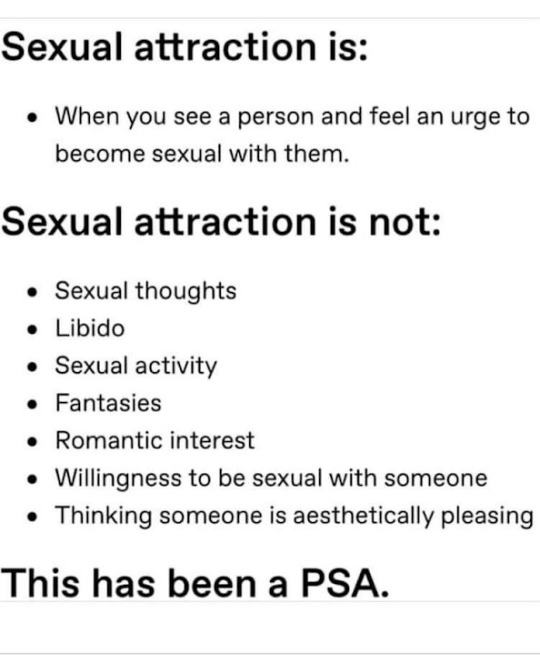
This is why decoupling the concepts of attraction and libido in your mind, whether you're ace or not, is important! Because although many ace people have low or nonexistent libidos, that isn't universally true. Unfortunately, sex-favorable aces often experience gatekeeping.
Asexuality 103: Terminology
Asexual comes from the prefix "a–", meaning "without", and the word "sexual", meaning who you're attracted to. Allosexual comes from the prefix "allo–", meaning “other”, and the same root. For this reason, the word allosexual is not a pejorative. It's simply a word that describes who you're attracted to. It's descriptive.
Similar to many other things regarding the so-called "LGBTQ discourse", disputing this is a red flag of GC talking points.
Asexuality 201:
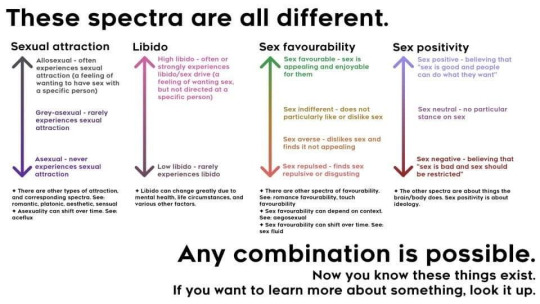
Because the above image has too many characters to fit in the alt text, and because these concepts are often misunderstood by both allo and ace people, I want to highlight each of those spectra:
1. Sexual attraction can vary from fully assexual to fully allosexual, i.e. from being attracted to no one, to being attracted to many people. No one can reasonably argue all allos are attracted to all people. Similarly, not all aces are attracted to no one. There are terms for these, which I will get into later, but for the most part ace identities, as with other LGBTQ identities, are best claimed by the people who experience them.
That is to say that if someone describes themselves as ace, they're ace. Period.
2. Libido, being fully separate from attraction, can vary from being nonexistent to very high. As the graphic states, libido can vary for many reasons such as mental health status, physical health, life stages, etc. Once again, libido is fully separate from attraction. One might think of the phrase, "the spirit is willing, but the flesh is weak." If you experience attraction on a fairly regular basis, but have a low libido, this is probably not best described as being ace.
3. Sex favorability is one's desire, or lack thereof, for sex *for themselves*. This is a factor that can be greatly influenced by outside factors such as, unfortunately, sexual abuse or trauma.
4. Sex positivity is one's opinion regarding sex *as a concept*. This means you can be, for example, fully sex-positive and fully sex-repulsed. In that case, you think it's anyone else's right to have sex if they like, but you don't want to. Ever. At all.
Asexuality 202:
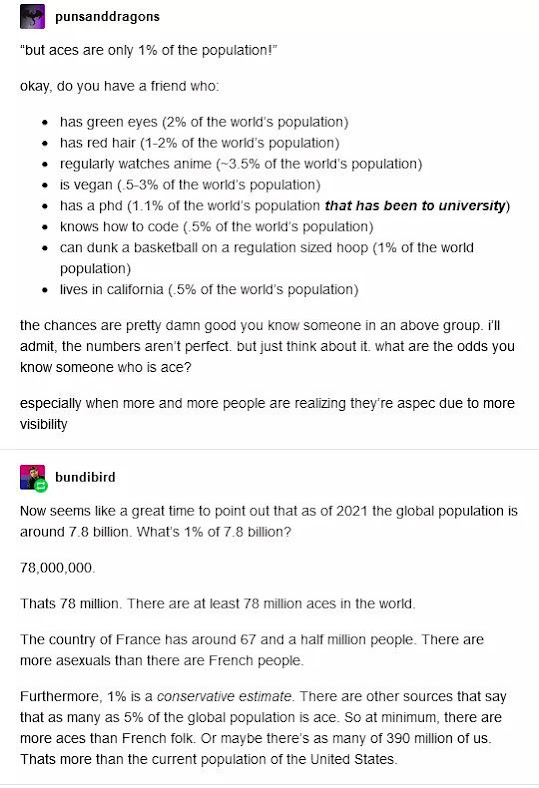
This means that although there are potentially fewer aces than others on the LGBTQ spectrum, they are LGBTQ.
Furthermore, consider this another reminder that gatekeeping LGBTQ identities is usually a red flag of GC talking points.
Asexuality 203:
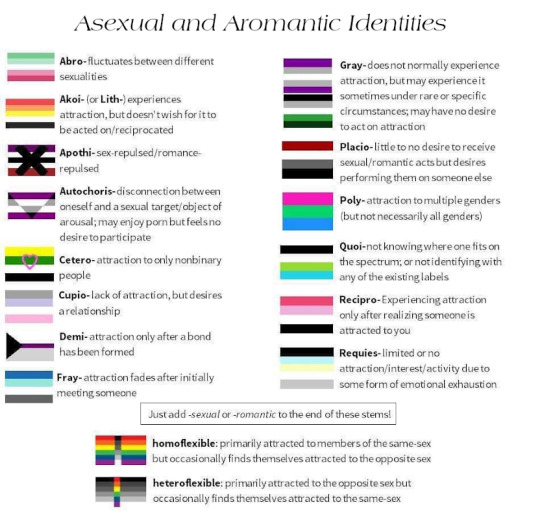
Now, although there are many labels and classifications, it should be emphasized that someone with no or low levels of attraction is primarily asexual.
If you are asexual, you are asexual, and you are LGBTQ.
(It will be addressed in a later post, but the desire to classify each type in smaller and smaller increments may lead to a feeling of fragmentation and invalidation among members of the LGBTQ community. If this thread is helping you realize you're ace, you're ace.)
Asexuality 301:
Confused now about whether or not you're ace? This level of the course is for you.

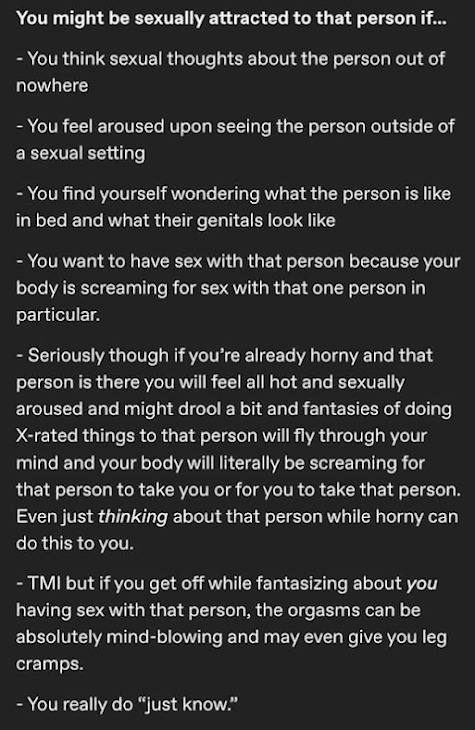
If you're asexual, the preceding images probably absolutely blew your mind. If you aren't, they probably just confirmed that fact for you.
It's okay to be ace, even if you didn't realize it until now!
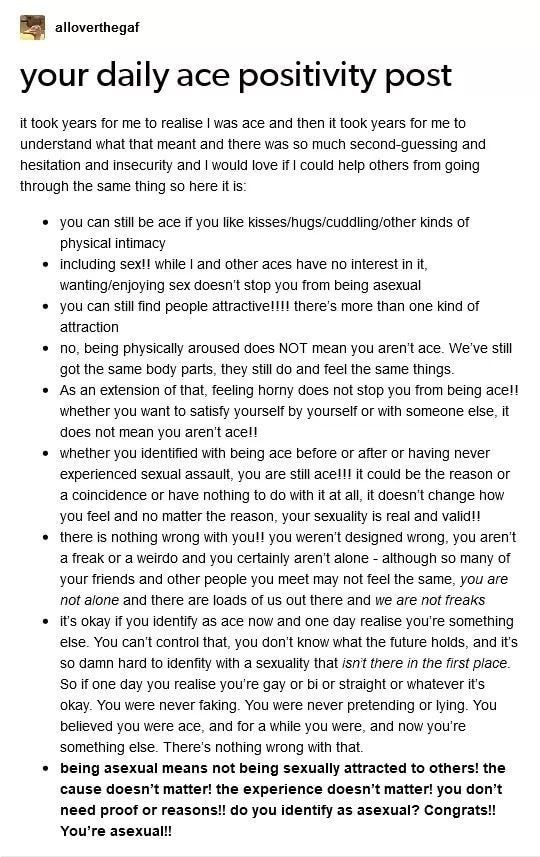
Still confused because you think you might have crushes?

In summary:
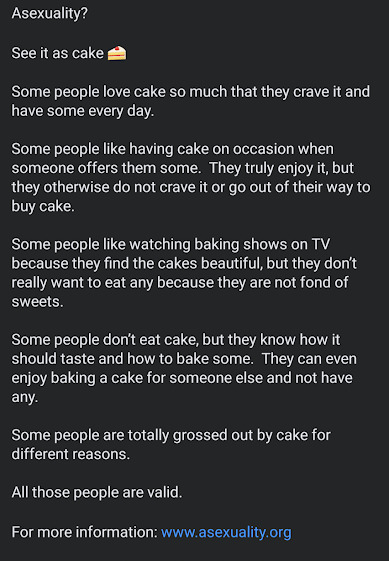
Asexuality 401:
If you're allo and want to understand even more, the following images will help.
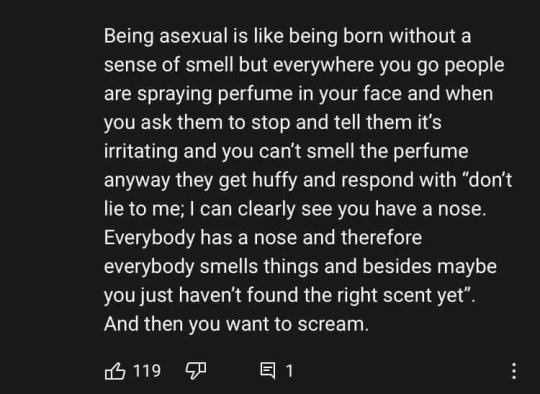
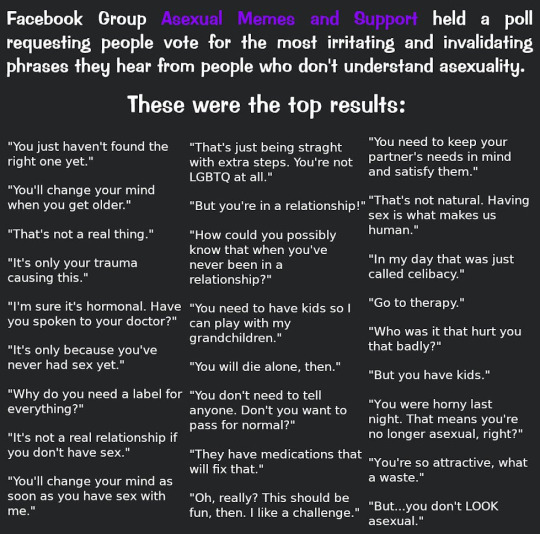
The preceding phrases and more are painful for asexuals to hear. Please consider phrases like these and educate yourself on asexuality before speaking up.
This concludes the Asexuality LGBTQ course. Feel free to comment in reply; helpful comments will be highlighted.
[This post can also be found on twitter.]
39 notes
·
View notes
Text
The Depiction of Women in Frankenstein: Mary Shelley as a Staple of Social Commentary
A/n: As promised, my final piece of uni writing! This landed me a 13.75/20, which means that it is fairly-well substantiated and a valid piece of literary analysis. The main point of critique was that I didn't interact or go into discourse enough with existing sources. Otherwise my essay was deemed "quite inspirational". So instead of uwu fanfiction I'd like to present you this more scientific and academic (maybe even boring) side of myself. Do enjoy!
P.s. My dm's are always open should anyone be interested in going into this a little bit more or should anyone have any questions.
The Depiction of Women in Frankenstein: Mary Shelley as a Staple of Social Commentary
Daughter of two vociferous literary revolutionaries and wife to a renowned poet and activist, societal expectations for Mary Shelley and her work were always set high. Her publication of Frankenstein was nothing short of successful and pivotal in that “Shelley invented modern science fiction” (Sturgis 59). Though the novel was initially presented and perceived as a “ghost story” (Shelley 7) there appeared to be an underlying tone of social commentary present. This, however, is not surprising, as Mary’s mother, Wollstonecraft, was an avid advocate for women’s rights and gender equality. It becomes apparent through the characterisation of women within the text that Shelley seeks to denounce the idealisation of uneducated, objectified and submissive women. In doing this she presented herself, akin to her mother, as an activist for women and their rights.
In this essay I will argue that Shelley condemns the view of women as submissive, passive creatures through the male protagonists’ descriptions of women. I will do this by analysing the stark contrast in depiction and characterisation of several women within the text, through the male protagonists’ eyes. To achieve this, I will primarily focus on three female characters, namely Elizabeth Lavenza, Safie and the female creature. I chose these personalities specifically because they each represent different values and types of women. In addition to this, I will also be touching on Mary Wollstonecraft’s call to the education of women as addressed in her A Vindication of the Rights of Woman. This because Shelley herself plays around with the same ideas and concepts. In doing so I will bring forward Shelley’s own advocation for the education and emancipation of women.
Before I start analysing Shelley’s work I want to introduce Mary Wollstonecraft’s A Vindication of the Rights of Woman. In her work, which was “the first book on women’s rights published anywhere in the world” (Botting 296), Wollstonecraft called for the education of women as she believed that “if woman isn’t fitted by education to become man’s compassion, she will stop the progress of knowledge” (2). She furthermore argues that education was crucial in women’s understanding so they wouldn’t revolt or rebel against their “duty” (Wollstonecraft 2). On top of this, she condemns the sensibilization of women, stating that “their conduct is unstable because they feel when they should reason: and their opinions are wavering because of contradictory emotions” (Wollstonecraft 42). Here we see that Wollstonecraft disapproves of the emotionalism of women and how she wants to step away from the stereotypical depiction of woman as a sentimental creature. In her work she ultimately claims that due to the lack of reason and plethora of sensation, women are considered to be weak and “fragile in every sense of the word” she also adds that they are therefore “obliged to look up to man for every comfort” (Wollstonecraft 42). This then implies that the emancipation of women is achieved through education and reason.
Continuing on, I would like to shift my focus to Shelley’s novel and its female characters. As stated before, I will be analysing the three figures of Elizabeth, Safie and the female creature. In this part of my essay I will concentrate on Elizabeth Lavenza specifically. I will be analysing her characterisation and portrayal through the eyes of Victor, the main narrator in the book. In the novel, we are introduced to Elizabeth through Victor who describes that she, as a “sweet orphan” (Shelley 35) was taken in by his parents. From the very start she is presented as some sort of object, Frankenstein’s mother even referring to her as “a pretty present for [her] Victor” (Shelley 35). He seems to consolidate this sentiment, describing Elizabeth as “[his]” (Shelley 36), the possessive pronoun reaffirming the objectification. Aside from being seen as a possession, we see that after mother Frankenstein passes away, Elizabeth is appointed the new matriarch of the house. This is especially shown here: “She devoted herself to those whom she had been taught to call her uncle and cousins” (Shelley 44). Here Elizabeth is presented as the nurturing, parental figure and even further along in the story we see that she often intervenes as a nurse or caretaker: “how often have I regretted not being able to perform it myself! I figure to myself that the task of attending on your sick bed has devolved on some mercenary old nurse, who could never guess your wishes, nor minister to them with the care and affection of your poor cousin” (Shelley 64). Examples such as these reinforce the portrayal of the compassionate, caring woman. In terms of her personality, we soon learn that Elizabeth is a very emotional and sensitive woman. A good example would be her reaction to the death of William: “She fainted, and was restored with extreme difficulty. When she again lived, it was only to weep and sigh” (Shelley 72). Remarkable here is that Victor is said to be the “comforter” (Shelley 73) of the family, which coheres with a concept that Wollstonecraft previously introduced: because Elizabeth is so frail and emotional she needs Victor’s support. Wollstonecraft’s sentiment regarding the wavering of rationality and reason due to overwhelming emotionality is furthermore confirmed when Elizabeth is called on as a witness during Justine’s trial. We see here that while “simple and powerful” Elizabeth’s testimony “was excited by her generous interference, and not in favour of poor Justine” (Shelley 85). In other words: her passions and emotions contributed to the conviction of her friend, thus reinforcing the idea that strong emotions are a weakness, as they cancel out any reason. In terms of characterisation, we also see that Elizabeth is often described as a “sweet girl” with “gentleness, and soft looks of compassion” (Shelley 189-190). Throughout his narration it becomes apparent that Victor sees Elizabeth, as the perfect woman, even going so far as to state that he “never saw any woman who excited, as Elizabeth does, [his] warmest admiration and affection” (Shelley 151). We can conclude from this, that Victor deems the emotionally vulnerable, nurturing and motherlike woman the ideal one.
The second character I will be discussing is Safie. Here it is important to mention that unlike Elizabeth and the female creature, this character is observed and narrated from the creature’s point of view. We are introduced to this character in chapter XIII when the monster is in hiding, taking refuge in a local cottage. Very noticeable is that in comparison to Elizabeth, the focus with Safie mostly lies on the woman’s physical features rather than her emotionality. The creature describes her as having “a countenance of angelic beauty and expression” (Shelley 116) and being “charming” (Shelley 121). In terms of her personality, the creature deems the Arabian to be “sweet” as well as “lovely” (Shelley 117). She is furthermore described to be “always gay and happy” (Shelley 118). While these traits are directly worded by the creature, through reading her story we see that Safie is actually a very brave, smart and self-governing woman rather than an overly sentimental one. Her independence and bravery were inspired by her mother who “taught her to aspire to higher powers of intellect, and an independence of spirit, forbidden to the female followers of Mahomet” (Shelley 124). Following her mother’s advice, Safie abandons her religion and sets out to Europe as “the prospect of marrying a Christian, and remaining in a country where women were allowed to take a rank in society, was enchanting to her” (Shelley 124). This reveals to the reader that Safie’s priorities include intelligence and independence, rather than motherhood or love. While Felix is definitely a romantic partner to her, having been referred to as her “lover” (Shelley 127), the marriage is also a sort of leverage, ensuring her freedom as it offers an escape from her repressive and sexist religion, as mentioned in the quote. However during her travels to unite with Felix, Safie’s companion falls ill and passes away, leaving her “unacquainted with the language of the country, and utterly ignorant of the customs of the world” (Shelley 127). Here her true bravery shines through as she keeps pushing forward with the help of an Italian family, despite being alone in a foreign country. Eventually once settled in with the De Laceys, the creature, who is equally “unacquainted” (Shelley 127), informs the reader on their learning process, stating that “she and [him] improved rapidly in the knowledge of language” (Shelley 118). This then also supports the statement that Safie is indeed a smart woman, being capable of learning a new language in a matter of months. When we apply Wollstonecraft’s philosophy to this, we see that Safie closely resembles that new woman considering that she is in touch with both her reason and passion. She furthermore endorses Wollstonecraft’s educational stance as she actively pursues knowledge. In terms of sensibility Safie has only been described to “[appear] affected by different feelings; wiping a few tears from her lovely eyes” (Shelley 117) once, when meeting Felix. We can conclude that in terms of this character we see a healthy balance between emotionality and rationality, therefore introducing a different “type” of woman. It is safe to say that Safie is to be regarded as “the incarnation of Mary Wollstonecraft in the novel” (Mellor 5).
Moving on, the third and final character I would like to discuss is the female creature. It is once again important to note that this part of the story is told from Victor’s perspective and that this creature was never actually brought to life. She was merely an idea and request. We learn that the idea of the female creature is introduced by Frankenstein’s monster, after he fails to find a human counterpart: “I am alone, and miserable; man will not associate with me; but one as deformed and horrible as myself would not deny herself to me. My companion must be of the same species, and have the same defects. This being you must create” (Shelley 144). This request, or demand, is however not well-received by Victor: “Shall I create another like yourself, whose joint wickedness might desolate the world? Begone!” (Shelley 145). However after a lot of contemplation and convincing, Victor agrees: “I consent to your demand, on your solemn oath to quit Europe for ever, and every other place in the neighbourhood of man, as soon as I shall deliver into your hands a female who will accompany you in your exile” (Shelley 148). The task proved easier said than done, as Victor struggles to “overcome [his] repugnance to the task which was enjoined [him]” (Shelley 149). Victor seems to think and overthink his decision until ultimately he decides against it, therefore breaking the agreement. He comes to this conclusion after thoroughly considering what a new creation might bring forward:
I was now about to form another being, of whose dispositions I was alike ignorant; she might become ten thousand times more malignant than her mate, and delight, for its own sake, in murder and wretchedness. He had sworn to quit the neighbourhood of man, and hide himself in deserts; but she had not; and she, who in all probability was to become a thinking and reasoning animal, might refuse to comply with a compact made before her creation. They might even hate each other; the creature who already lived loathed his own deformity, and might he not conceive a greater abhorrence for it when it came before his eyes in the female form? She also might turn with disgust from him to the superior beauty of man; she might quit him, and he be again alone, exasperated by the fresh provocation of being deserted by one of his own species. (Shelley 165)
This revelation brings more to light than meets the eye and requires a more thorough reading. I will start with analysing the female creature’s speculated character. This is speculation because she was never actually brought to life. In other words: this version of the female creature only ever existed in Victor’s inner thoughts. Nonetheless, we see that this female is depicted as malevolent or violent and seemingly emancipated since she might not conform with what her creator, Frankenstein, imposes on her. On the other hand, the creature is also described as “a thinking and reasoning animal” (Shelley 165), which strives from Victor’s ideal woman (cf. Elizabeth) and makes her a threat. Here lies the sexism and Shelley’s critique thereof. She exposes Victor because “he is afraid of an independent female will, afraid that his female creature will have desires and opinions that cannot be controlled by his male creature” (Mellor 6). What we can also deduce from this is that Frankenstein seeks to adhere to the “sexist aesthetic that insists that women be small, delicate, modest, passive, and sexually pleasing – but available only to their lawful husbands” (Mellor 7). We see throughout the story that aesthetics and beauty are important virtues as both Elizabeth and Safie, though perceived by two different protagonists, are praised for their beauty. This is in stark contrast with the female creature, as Frankenstein reasons that the male creature might perceive her as a “greater abhorrence” (Shelley 165). Shelley with this shows the superficial mind of Victor Frankenstein and brings a whole system of sexism in societal standards to light. It is remarkable to see how, despite never even having lived, the female creature becomes one of the most crucial characters in outing her criticisms.
When comparing the three female characters with one another, we notice a sort of spectrum. On the one end there is Elizabeth who is seen as the perfect woman and wife by Victor’s standards and on the other end we have the female creature who is nothing short of horrifying, violent and a threat to him and his standards. Somewhere in the middle we then find Safie, the fictional embodiment of Wollstonecraft and her ideals. Now, what sets Elizabeth apart from these other two women is her objectification. She is often presented as a matriarch and sometimes even an object or something akin to a pet in relation to Victor. She is submissive and for the most part reliant on the men in her life as previously mentioned. The other two women differ in that they strive for emancipation and independence. Furthermore these two women are described as rational creatures, rather than “sensible” or emotional ones, which is exactly what Wollstonecraft was advocating for.
To conclude, while Shelley’s Frankenstein at first glance presents itself as a “ghost story” (Shelley 7), a thorough, more critical read brings to light a sharp piece of social commentary. Shelley masked her criticisms, which were heavily inspired by her mother’s A Vindication for the Rights of Woman, by writing mostly from the perspective of males. These criticisms entailing women and the sexist expectations that society has provided are revealed through the male depiction of three female characters. There are several things to be established surrounding these women. First of all it becomes apparent that Victor favours his Elizabeth, who is the staple of a housewife: submissive, oppressed and dependent on her husband or provider. Then there is the self-governing Safie, who travelled across the continent just to obtain her freedom as a woman. The third and final personality, the female creature, is pivotal in that she is the epitome of Shelley’s critique. Victor Frankenstein fears this female creation as she is rational and will likely have a strong will of her own and can therefore not be controlled by his male creature. He furthermore is appalled by this creature as she does not conform with the stereotypical beauty standard. Throughout this narration Shelley brought to light the intricate and subtle elements of sexism in which Victor, the man, presents himself as superior to women. Shelley’s work went on to inspire and “managed to change the Western world’s conception of women’s rights, human reason, education theory and romantic love” (Sturgis 55). In her work Shelley advocates, as her mother before her, for the education of women and gender equality and seeks to denounce the submissive woman as a whole.
(2681 words)
Works Cited
Botting, Eileen Hunt. “Crossing Borders and Bridging Generations: Wollstonecraft's ‘Rights of Woman’ as the ‘Traveling Feminist’ Classic.” Women's Studies Quarterly, vol. 35, no. 3/4, 2007, pp. 296–301.
Mellor, Anne K. “Possessing Nature: The Female in Frankenstein.” Frankenstein: The 1818 Text, Contexts, Criticism. By Mary Wollstonecraft Shelley. Ed. J. Paul Hunter. New York: W.W. Norton, 2012.
Shelley, Mary. Frankenstein. Edited by M.K. Joseph, Oxford University Press, 2008.
Sturgis, Amy H. "Feminism, Frankenstein, and Freedom." Reason, vol. 47, no. 2, 2015, pp.54-60, 6.
Wollstonecraft, Mary. A Vindication of the Rights of Woman. Edited by J. Bennett, Oxford University Press, 2017.
#uni stuff#literary analysis#mary shelley#frankenstein#mary wollstonecraft#a vindication of the rights of woman
41 notes
·
View notes
Note
Hey Goldy,
feel free to disagree but i was thinking about the whole jimin wanting to bulid muscles thing and i remembered blood sweat and tears era....the whole thing back then was that he was pushing himself to look like what an idol is 'supposed' to look like. so right now him trying to bulid muscles might be bcuz he wants to look more like a perfect idol and just have the kind of body that is expected of him as an idol. this is similar to many female idols trying to be really skinny to fit in with the toxic standards of being an idol. so more so than toxic masculinity i guess we should be worried about him conforming to toxic idol body standards.
If you don't mind, I agree with you.
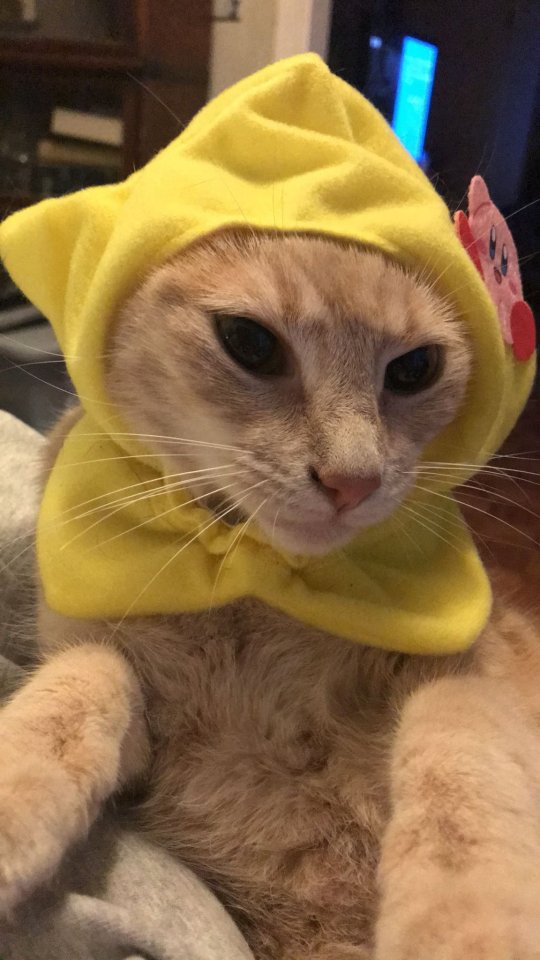
Your point is equally part of the discourse: unrealistic male body standards, strict and toxic beauty standards for idols, toxic masculinity- I think they are all intersectional cousins living on the same continent. It don't mean they are mutually exclusive or that the presence of one excludes the other.
Jimin could very well be grappling with all of these at once we will never know- much like headache. You think it's just your head, next you know you feeling cold too, then you're dizzy, puking, passing out and explaining to your doctor why you're gay but think your period is late. Then you find out you're not pregnant but you wish you were because what you've been diagnosed with is far worse than being pregnant by a phantom Male who probably might have raped you when you were passed out even though you hate men and it's like WHAT ARE WE EVEN HERE ON EARTH FOR?!
Not that any of that happened to me.
As I said in the last post, I think skinny and androgymasculine is the body standard for men in Kpop. Most male idols who get cosmetic surgery or makeup do not do it to enhance their traditional masculine features. They try to look soft and feminine- especially around the jaw so it looks more oval and feminine.
When any of the members gain body weight they are immediately placed on a diet- whether or not that is healthy is another issue to debate on. You know what I think.

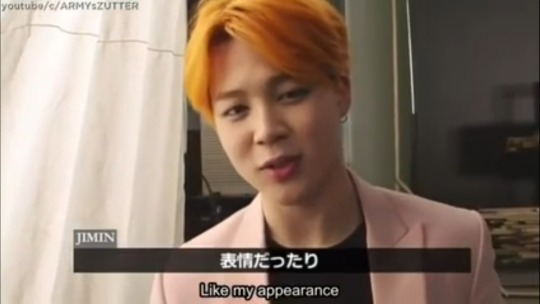
Fans and antis alike blatantly call the members fat and complain about their appearance, that they look chubby or fat even though sometimes it's just the bulkiness that comes from building muscles.
Much like Jimin defending Jungkook when a fan called him fat. He explained it was muscle not fat. What's wrong with being fat?
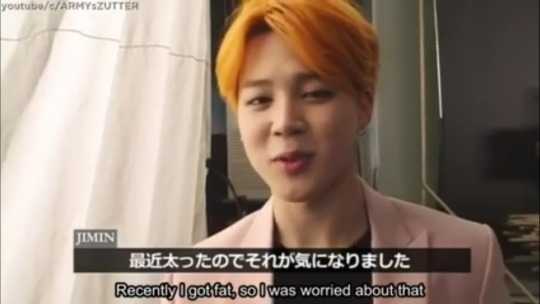
The fatphobia and fat shaming in Kpop is one conversation I sincerely don't think y'all are ready for, given recent events. Didn't Suga, the lady from Twice and one guy from Enhypen come under such vicious attacks for being fat in recent times?
People were making fun of her for being 'fat' and some assumed initially she was pregnant or something of the sorts- allegedly. Can't verify the source or identify how recent this was.
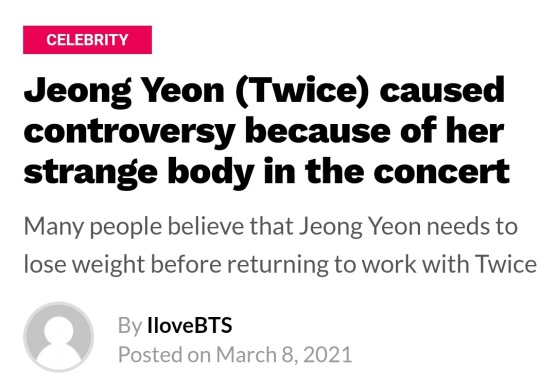
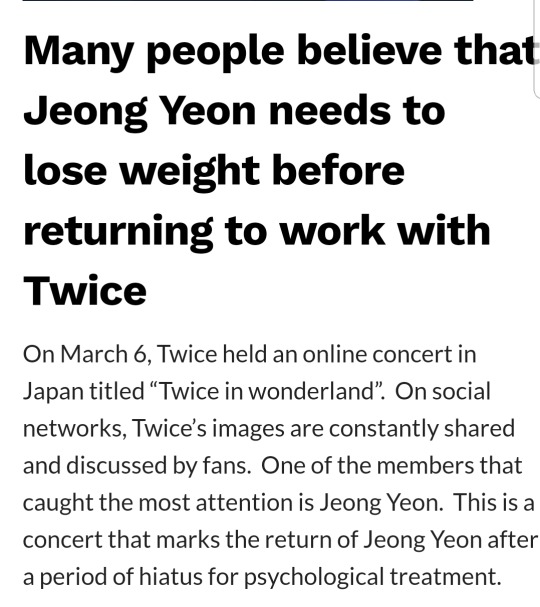
That this piece was written by someone called I love BTS is not ironic, the main irony is that the lady being fat shamed for showing her biceps and belly had just returned from a hiatus during which she had sought psychological treatment for her mental health.
The things these Idols do to maintain the looks we see on screen is outrageous and really worrying- to some of us at least. Jungkook recently saying he didn't eat anything for about 5 days when they filmed the butter MV gave me palpitations. I hope they stop glorifying these things as if it's something to be proud of. It's disconcerting at best. But what do I know, I have to leave people to make their own choices I'm told.
If I choose to harm myself because I feel pressured by my work environment it's not a choice it's oppression. Just saying.
And yes, people can CHOOSE to do bad things to themselves. it don't make those bad choices right and that's the nuance of the conversation we are having.
And I hope people who fat shame the boys know and understand the risks they take and how hard they work to meet these beauty and body standards- IT'S RIDICULOUS.
Jimin calling himself fat is not a choice. It's him cracking under the pressure of Idolhood. Like I said, he is prone to these things. And saying he is mature now and so he cannot be affected by these pressures is obtuse and toxically positive.
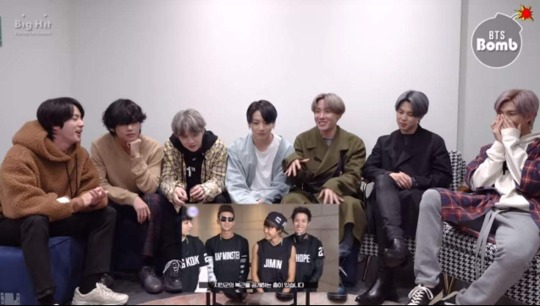

If you've been paying attention to Jimin for sometime now since On Era last year, he's not been talking positively about his body especially whenever they talk about his early days and when they've reacted to their debut.
He's talked about how his body looked so great then as compared to now- even though it was ON ERA and he looked pretty buffed- relatively speaking.
RM felt his biceps and told him his body now was ok. Seems to me whatever is going on with him and his view of his body now didn't just begin. Something is just acting as catalyst and bringing it all up to the surface.
He's comparing himself to his debut days and thinking that masculine aesthetics- which he himself said was a trap for him and was glad he had overcome that, "hurry up and be me now" - he's backpedaling to say that looks better than his present look.
Towards the end of 2020 we saw him proudly sporting Illucebra Arcanus- male and female adjectives, the bigender symbol, and proudly comparing his body to a flower because he says it was delicate.
But it seems to me he is struggling internally with identifying himself or trying to fit into these labels external to him. Not to be psychoanalytic or anything. I think I talked about this in one of my blogs. A florist described him as delicate during Run and he's since been using that word to describe his features. I think he wears his internal struggles on his identity on his sleeves which is very typical of people with dual like gender identities or identities that exist on a spectrum ranging from one form to the other rather than being gender A or B- sometimes those identities conflict.
He's on a journey to self discovery I'd say and that includes deciding for himself what he is rather than bending to the labels of what people think he is or should be.
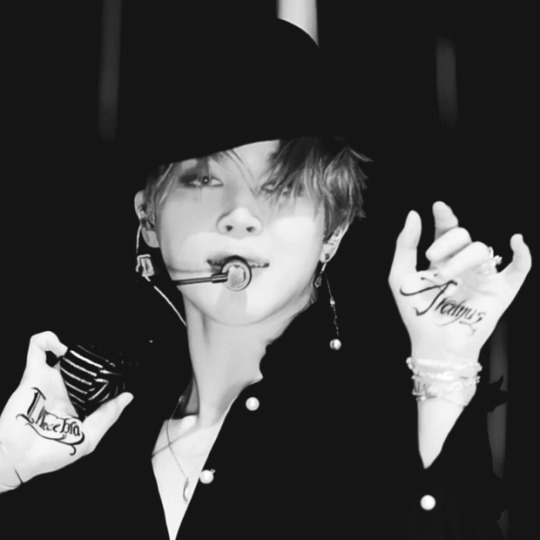
Androgyny can be attained by make up, or clothes- it can be fashion or trend but it is also a valid form of identity.
All these songs they write about persona, ego, map of the soul... these are very Carl Jung in nature and it's not far fetched to assume they dabble in these things and learn from it to shape their own understanding of who they are- Jimin pays attention to these things and if you are a huge fan of his you'd know which moments I'm referring to.
Non of these however exempts him or preclude him from having toxic notions of masculinity I'm afraid.
It's like assuming gay people can't be homophobic or black people can't be racist.
I don't know why people are struggling to wrap around that Jimin struggles with toxic masculinity tendencies when he has addressed that very issue himself on several occasions- I'm simply putting a name to it. Toxic masculinity don't mean he is a toxic person or man. A toxic man can have toxic masculinity on top of his toxicity.
A woman can be a perpetrator of toxic masculinity if they are prone to expecting men to behave in a certain way that is harmful to men and other women.

These are the people who call skinny, effeminate men weak and gay and expect or encourage men to be heroes, and violent and aggressive and even nurture those traits in their men.
I do agree with Jimin pushing himself to look like the perfect idol in the past- I did, have and will continue to condemn that choice he makes from time to time just as I condemn the toxic masculinity now.
It's interesting how you see him bending to the pressures to look as an idol in kpop as a problem and articulate it well but fail to see that an ad which is pro manly men would have a similar effect on him to push him to look a certain way which is opposite of how he looks naturally- especially when he's been questioning himself for quite some time now.
If fat shaming causes idols to loose weight, there's a shaming that causes effeminate men to want to bulk up. And if the former is fatphobia and can be internalized, the later is toxic masculinity and can be internalized too.
If an idol loosing weight to meet a strict standard is not about their choice and personal body preference, skinny men gyming to bulk up isn't so much about choice either. It's nuanced in that way and those two can be happening together at the same time.
I'm ok if he is not feeling pressured to look a certain way- whether skinny or buff. If it's his choice and his alone it is not toxic masculinity or internalized fatphobia.
I loved reading your POV. Thank you.
Signed,
GOLDY
53 notes
·
View notes
Text
Lesbian Unintelligibility in Pre-1989 Poland
Selection from ""No one talked about it": The Paradoxes of Lesbian Identity in pre-1989 Poland, by Magdalena Staroszczyk, in Queers in State Socialism: Cruising 1970s Poland, eds. Tomasz Basiuk and Jędrzej Burszta, 2021
The question of lesbian visibility is pertinent today because of the limited number of lesbian-oriented activist events and cultural representations. But it presents a major methodological problem when looking at the past. That problem lies in an almost complete lack of historical sources, something partly mended with oral history interviews, but also in an epistemological dilemma. How can we talk about lesbians when they did not exist as a recognizable category? What did their (supposed) non-existence mean? And should we even call those who (supposedly) did not exist “lesbians”?
To illustrate this problem, let me begin with excerpts from an interview I conducted for the CRUSEV project [a study of queer cultures in the 1970s]. My interlocutor is a lesbian woman born in the 1950s, who lived in Cracow most of her life:
“To this very day I have a problem with my brothers, as I cannot talk to them about this. They just won’t do it, I would like to talk, but. . . . They have this problem, they lace up their mouths when any reference is made to this topic, because they were raised in that reality [when] no one talked about it. It was a taboo. It still is. ... I was so weak, unable to take initiative, lacking a concept of my own life—all this testifies to the oppression of homosexual persons, who do not know how to live, have no support from [others], no information or knowledge learned at school, or from a psychologist. What did I do? I searched in encyclopaedias for the single entry, “homosexuality.” What did I learn? That I was a pervert. What did it do to me? It only hurt me, no? Q: Was the word lesbian in use? Only as a slur. Even my mother used it as an offensive word. When she finally figured out my orientation, she said the word a few times. With hatred. Hissing the word at me.”
The woman offers shocking testimony of intense and persistent hostility towards a family member—sister, daughter—who happens to be a lesbian. The brothers and the mother are so profoundly unable to accept her sexuality that they cannot speak about it at all, least of all rationally. The taboo has remained firmly in place for decades. How was it maintained? And, perhaps more importantly, how do we access the emotional reality that it caused? The quotes all highlight the theme of language, silence, and something unspeakable. Tabooization implies a gap in representation, and the appropriate word cannot be spoken but merely hissed out with hatred.
Popular discourse and academic literature alike address this problem under the rubric of “lesbian invisibility” (Mizielińska 2001). I put forward a different conceptual frame, proposing to address the question of lesbian identity in pre-1989 Poland not in terms of visibility versus invisibility, but instead in terms of cultural intelligibility versus unintelligibility. The former concepts, which have a rich history in discussions of pre-emancipatory lesbian experience, presume an already existing identity that is self-evident to the person in question. They assume the existence of a person who thinks of herself as a lesbian. One then proceeds to ask whether or not this lesbian was visible as such to others, that is, whether others viewed her as the lesbian she knew she was. Another assumption behind this framing is that the woman in question wished to be visible although this desired visibility had been denied her. These are some of the essentializing assumptions inscribed in the concept of (in)visibility. Their limitation is that they only allow us to ask whether or not the lesbian is seen for who she feels she is and wishes to be seen by others.
By contrast, (un)intelligibility looks first to the social construction of identity, especially to the constitutive role of language. To think in those terms is to ask under what conditions same-sex desire between women is culturally legible as constitutive of an identity. So, instead of asking if people saw lesbians for who they really were, we will try to understand the specific epistemic conditions which made some women socially recognizable to others, and also to themselves, as “lesbians.” This use of the concept “intelligibility” is analogous to its use by Judith Butler in Gender Trouble, as she explains why gender conformity is key to successful personhood[...].
For Butler, cultural intelligibility is thus an aspect of the social norm, as it corresponds to “a normative ideal.” It is one of the conditions of coherence and continuity requisite for successful personhood. In a similar vein, to say that lesbians in the People’s Republic of Poland were not culturally intelligible is of course not to claim that there were no women engaged in same-sex romantic and erotic relationships—such a conclusion would be absurd, as well as untrue. It is, rather, to suggest that “lesbian” was not a category of personhood available or, for that matter, desirable to many nonheteronormative women. The word was not in common use and it did not signify to them the sort of person they felt they were. Nor was another word readily available, as interlocutors’ frequent periphrases strongly suggest, for example, “I cannot talk to them about this. ... They ... lace up their mouths when any reference is made to this topic” (my emphases).
Interviews conducted with women for the CRUSEV project are filled with pain due to rejection. So are the interviews conducted by Anna Laszuk, whose Dziewczyny, wyjdźcie z szafy (Come Out of the Closet, Girls! 2006 ) was a pioneering collection of herstories which gave voice to non-heteronormative Polish women of different ages, including those who remember the pre-1989 era. Lesbian unintelligibility is arguably a major theme in the collection. The pain caused by the sense of not belonging expressed by many illustrates that being unintelligible can be harmful. At the same time, unintelligibility had some practical advantages. The main among them was relative safety in a profoundly heteronormative society. As long as things went unnamed, a women-loving woman was not in danger of stigmatization or social ostracism.
Basia, born in 1939 and thus the oldest among Laszuk’s interviewees, offers a reassuring narrative in which unintelligibility has a positive valence:
“I cannot say a bad word about my parents. They knew but they did not comment. . . . My parents never asked me personal questions, never exerted any kind of pressure on me to get married. They were people of great culture, very understanding, and they quite simply loved me. They would meet my various girlfriends, but these were never referred to as anything but “friends” (przyjaciółki). Girls had it much easier than boys because intimacy between girls was generally accepted. Nobody was surprised that I showed up with a woman, invited her home, held her hand, or that we went on trips together.” (Laszuk 2006, 27)
The gap between visceral knowing and the impossibility of naming is especially striking in this passage. The parents “knew” and Basia knew that they knew, but they did not comment, ask questions, or make demands, and Basia clearly appreciates their silence as a favour. To her, it was a form of politeness, discreetness, perhaps even protectiveness. The silence was, in fact, a form of affectionate communication: “they quite simply loved me.”
Another of Laszuk’s interviewees is Nina, born around 1945 and 60 years old at the time of the interview. With a certain nostalgia, Nina recalls the days when certain things were left unnamed, suggesting that there is erotic potential in the unintelligibility of women’s desire. Laszuk summarizes her views:
“Nina claims that those times certainly carried a certain charm: erotic relationships between women, veiled with understatement and secrecy, had a lot of beauty to them. Clandestine looks were exchanged above the heads of people who remained unaware of their meaning, as women understood each other with half a gesture, between words. Nowadays, everything has a name, everything is direct.” (Laszuk 2006, 33)
A similar equation between secrecy and eroticism is drawn by the much younger Izabela Filipiak, trailblazing author of Polish feminist fiction in the 1990s and the very first woman in Poland to publicly come out as lesbian, in an interview for the Polish edition of Cosmopolitan in 1998. Six years later, Filipiak suggested a link between things remaining unnamed and erotic pleasure, and admitted to a certain nostalgia for this pre-emancipatory formula of lesbian (non)identity. Her avowed motivation was not the fear of stigmatization but a desire for erotic intensity:
“When love becomes passion in which I lose myself, I stop calculating, stop comparing, no longer anchor it in social relations, or some norm. I simply immerse myself in passion. My feelings condition and justify everything that happens from that point on. I do not reflect upon myself nor dwell on stigma because my feeling is so pure that it burns through and clears away everything that might attach to me as a woman who loves women.” (Kulpa and Warkocki 2004)
Filipiak acknowledges the contemporary, “postmodern” (her word) lesbian identity which requires activism and entails enumerating various kinds of discrimination. But paradoxically—considering that she is the first public lesbian in Poland—she speaks with much more enthusiasm about the “modernist lesbians” described by Baudelaire:
“They chose the path of passion. Secrecy and passion. Of course, their passion becomes a form of consent to remain secret, to stay invisible to others, but this is not unambivalent. I once talked to such an “oldtimer” who lived her entire life in just that way and she protested very strongly when I made a remark about hiding. Because, she says, she did not hide anything, she drove all around the city with her beloved and, of course, everyone knew. Yes, everyone knew, but nobody remembers it now, there is no trace of all that.” (Kulpa and Warkocki 2004)
Cultural unintelligibility causes the gap between “everyone knew” and “nobody remembers” but it is also the source of excitement and pleasure. For Filipiak’s “old-timer” and her predecessors, Baudelaire’s modernist lesbians, the evasion, or rejection, of identity and the maintaining of secrecy is the path of passion. Crucially, these disavowals of identity mobilize a discourse of freedom rather than hiding, entrapment, or staying in the closet. The lack of a name is interpreted as an unmooring from language and a liberation from its norms.
Needless to say, cultural unintelligibility may also lead to profound torment and self-hatred. In the concept of nationhood generated by nationalists and by the Catholic Church in Poland, lesbians (seen stereotypically) are double outsiders whose exclusion from language is vital.[1] A repentant homosexual woman named Katarzyna offers her testimony in a Catholic self-help manual addressing those who wish to be cured of homosexuality. (It is irrelevant for my purpose whether the testimony is authentic; my interest is in the discursive construction of lesbian identity as literally impossible and nonexistent.) Katarzyna speaks about her search for love, her profound sense of guilt and her disgust with herself. The word “lesbian” is never used; her homosexuality is framed as confusion and as straying from her true desire for God. The origin of the pain is the woman’s unintelligibility to herself:
“Only I knew how much despair there was in my life on account of being different. First, there was the sense of being torn apart when I realized how different my desires were from the appearance of my body. Despite the storm of homosexual desire, I was still a woman. Then, the question: What to do with myself? How to live?” (Huk 1996, 121)
A woman cannot love other women—the subject knows this. We can speculate that her knowledge is due to her Catholic upbringing; she has internalized the teaching that homosexuality is a sin, and thus untrue and not real. The logic of the confession is overdetermined: the only way for her to become intelligible to herself is to abandon same-sex desire and turn to God, and through him to men. Church language thus frames homosexuality as chaos: it is a disordered space where no appropriate language can obtain. Within this frame, unintelligibility is anything but erotic. It is rather an instrument of shaming and, once internalized, a symptom of shame.
For many, the experience of unintelligibility is moored in intense heteronormativity, without regard to Church teachings or the language of national belonging. Struggling with the choice between social intelligibility available to straights and leading an authentic life outside the realm of intelligibility, one CRUSEV interlocutor, aged 67, describes her youth in 1960s and 1970s:
“I always knew I was a lesbian ... and if I am one, then I will be one. Yes, in that sense. And not to live the life of a married woman, mother and so on. This life wasn’t my life at all. However, as I said, it was fine in an external sense. So calm and well-ordered: a husband, nice children, everything, everything. But it was external, and my life was not my life at all, it wasn’t me.”
She thus underscores her internal sense of dissonance, a felt incompatibility with the social role she was playing. The role model of a wife and mother was available to her, but a lesbian role model was not.
The discomfort felt at the unavailability of a role model may have had different consequences. Another CRUSEV interviewee, aged 62, describes her impulse to change her life so as to authentically experience her feelings for another woman, in contrast to that woman’s ex:
“She visited me a few times, and it was enough that I wrote something, anything ... [and] she would get on the train and travel across the country. There were no telephones then, during martial law. Regardless of anything, she would be there. And at one point I realized that I ... damn, I loved her. ... She broke up with her previous girlfriend very violently—this may interest you—because it turned out that the girl was so terribly afraid of being exposed and of some unimaginable consequences that she simply ran away.”
The fear of exposure, critically addressed by the interlocutor, was nonetheless something she, too, experienced. She goes on to speak of “hiding a secret” and “stifling” her emotions.
A concern with leading an inauthentic life resurfaces in the account of the afore-quoted woman, aged 67:
“I couldn’t reveal my secret to anyone. The only person who knew was my friend in Cracow. I led such a double life, I mean. ... It is difficult to say if this was a life, because it was as if I had my inner spirituality and my inner world, entirely secret, but outside I behaved like all the other girls, so I went out with some boys. ... It was always deeply suppressed by me and I was always fighting with myself. I mean, I fell in love [with women] and did everything to fall out of love [laughter]. On and on again.”
Her anxiety translates into self-pathologizing behaviour:
“In 1971 I received my high school diploma and I was already . . . in a relationship of some years with my high school girlfriend. . . . But because we both thought we were abnormal, perverted or something, somehow we wanted to be cured, and so she was going to college to Cracow, and I to Poznań. We engaged in geographic therapy, so to speak.”
The desire to “be cured” from homosexuality recurs in a number of interviews. Sometimes it has a factual dimension, as interlocutors describe having undergone psychotherapy and even reparative therapy—of course, to no avail.
Others decide to have a relationship with a woman after years spent in relationships with men. Referring to her female partner of 25 years, who had previously been married to a man, one of my interlocutors suggests that her partner had been disavowing her homosexual desires for many years before the two women’s relationship began: “the truth is that H. had struggled with it for more than 20 years and she was probably not sure what was going on.” Despite this presumed initial confusion, the women’s relationship had already lasted for more than 25 years at the time I conducted the interview.
Recognizing one’s homosexual desires did not necessarily have to be difficult or shocking. It was not for this woman, aged 66 at the time of the interview:
“It was obvious to me. I didn’t, no, no, I didn’t suppress it, I knew that [I was going], “Oh, such a nice girl, I like this one, with this one I want to be close, with that one I want to talk longer, with that one I want to spend time, with that one I want, for example, to embrace her neck or grab her hand”.”
Rather, what came as a shock was the unavailability of any social role or language corresponding to this felt desire that came as a shock. The woman continues:
“It turned out that I couldn’t talk to anyone about it, that I couldn’t tell anyone. I realized this when I grew up and watched my surroundings, family, friends, society. I saw that this topic was not there! If it’s not there, how can I get it out of myself? I wasn’t so brave.”
The tabooization of homosexuality—its unintelligibility—is a recurring thread in these accounts; what varies is the extent to which it marred the subjects’ self-perception.
#lgbtq history#poland#lesbian history#unintelligibility#lesbian unintelligibility#this might be deleted in the future so read it while you can
31 notes
·
View notes
Text
America’s Gay Men in WW2

World War Two was a “National Coming Out” for queer Americans.
I don’t think any other event in history changed the lives of so many of us since Rome became Christian.
For European queers the war brought tragedy.
The queer movement began in Germany in the 1860s when trans activist Karl Ulrichs spoke before the courts to repeal Anti-Sodomy laws. From his first act of bravery the movement grew and by the 1920s Berlin had more gay bars than Manhattan did in the 1980s. Magnus Hirschfeld’s “Scientific Humanitarian Committee” fought valiantly in politics for LGBT rights and performed the first gender affirmation surgeries. They were a century ahead of the rest of the world.
The Nazis made Hirschfeld - Socialist, Homosexual and Jew - public enemy number one.
The famous image of the Nazis burning books? Those were the books of the Scientific Humanitarian Committee. Case studies of the first openly queer Europeans, histories, diaries - the first treasure trove of our history was destroyed that day.
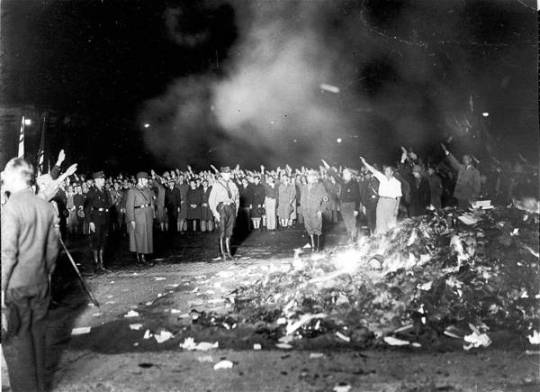
100,000 of us were charged with felonies. As many as 15,000 were sent to the camps, about 60% were murdered.
But in America the war brought liberation.
In a country where most people never even heard the word “homosexual” , historian John D’emilio wrote the war was “conducive both to the articulation of a homosexual identity and to the more rapid evolution of a gay subculture. (24)” The war years were “a Watershed (Eaklor 68)”
Now before we begin I need to give a caveat. The focus of this first post is not lesbians, transfolk or others in our community. Those stories have additional complexity the story of cisgender homosexual men does not. Starting with gay men lets me begin in the simplest way I can, in subsequent posts I’ll look at the rest of our community.
Twilight Aristocracy: Being Queer Before the War
I want us to go back in time and imagine the life of the typical queer American before the war. Odds are you lived on a farm and simply accepted the basic fact that you would marry and raise children as surely as you were born or would die. You would have never seen someone Out or Proud. If you did see your sexuality or gender in contrary ways you had no words to express it, odds are even your doctor had never heard the term “Homosexual. In your mind it was just a quirk, without a name or possible expression.
In the city the “Twilight Aristocracy” lived hidden, on the margins and exposed their queerness only in the most coded ways. Gay men “Dropping pins” with a handkerchief in a specific pocket. Butch women with key chains heavy enough to show she didn’t need a man to carry anything for her. A secret language of “Jockers” and “Nances” “Playing Checkers” during a night out. There is a really good article on the queer vernacular here
And these were “Lovers in a Dangerous Time.”
In public one must act as straight as possible. Two people of the same gender dancing could be prosecuted. Cross dressing, even with something as trivial as a woman wearing pants, would run afoul of obscenity laws.

The only spaces we had for ourselves were dive bars, run by organized crime. But even then one must be sure to be circumspect, and act straight. Anyone could be an undercover cop. If a gaze was held to long, or lovers kissed in a corner the bar would be raided. Police saw us as worthy candidates for abuse so beatings were common and the judge would do all he could to humiliate you.
Now Michael Foucault, the big swinging french dick of queer theory, laid out this whole theory about how the real policing in a society happens inside our heads. Ideas about sin, shame, normalcy, mental illness can all be made to control people, and the Twilight Aristocracy was no different.
While cruising a park at night, or settled on the sofa with a lifelong lover, the thoughts of Priests and Doctors haunted them. “Am I living in Sin? Am I someone God could love?” “Is this healthy? Have I gone mad? Is this a true love or a medical condition which requires cure?”
There was no voice in America yet healing our self doubt, or demanding the world accept us as we are. And that voice, the socialist Harry Hay, did not come during the war, but it would come shortly after directly because of it.
Johnny Get Your Gun… And are you now or ever been a Homosexual?
For the first time in their lives millions of young men crossed thousands of miles from their home to the front.
But before they made that brave journey they had another, unexpected and often torturous journey. The one across the doctor’s office at a recruiting station.
In the nineteenth century queerness moved from an act, “Forgive me Father I have sinned, I kissed another man” to something you are, “The homosexual subspecies can be identified by certain physical and psychological signs.”
These were the glory days of patriarchy and white supremacy, those who transgressed the line between masculine and feminine called the whole culture into question. So doctors obsessed themselves with queerness, its origins, its signs, its so called catastrophic racial consequences and its cure.
“Are you a homosexual?” doctors asked stunned recruits.
If you were closeted but patriotic, you would of course deny the accusation. But the doctor would continue his examination by checking if you were a “Real Man.”
“Do you have a girlfriend? Did you like playing sports as a kid?”
If you passed that, the doctor would often try and trip you up by asking about your culture.
“Do you ever go basketeering?” he would ask, remembering to check if there was any lisp or effeminacy in your voice.
Finally if the doctor felt like it he could examine your body to see if you were a member of the homosexual subspecies.
Your gag reflex would be tested with a tongue depressor. Another hole could be carefully examined as well.
Humiliating enough for a straight man. But for a gay recruit the consequences could be life threatening.
Medical authorities knew homosexuals were weak, criminal and mad. To place them among the troops would weaken unit cohesion at the very least, result in treachery at the worst. In civilian life doctors had much the same thing to say.
The recruit needed a cure. And a doctor was always ready. With talk therapy, hypnosis, drugs, electroshock and forced surgeries of the worst kinds there was always a cure ready at hand.
Thankfully the doctors were not successful in their task, one doctor wrote “for every homosexual who was referred or came to the Medical Department, there were five or ten who never were detected. (d’Emilio 25)”
Here’s the irony though, by asking such pointed and direct questions to people closeted to themselves it forced them to confront their sexuality for the first time.
Hegarty writes, “As a result of the screening policies, homosexuality became part of wartime discourse. Questions about homosexual desire and behavior ensured that every man inducted into the armed forces had to confront the possibility of homosexual feelings or experiences. This was a kind of massive public education about homosexuality. Despite—and be-cause of—the attempts to eliminate homosexuals from the military, men with same-sex desires learned that there were many people like themselves (Hegarty 180)”
And then it gave them a golden opportunity to have fun.
The 101st Airborn - Homosocial and Homosexual
“Homosocial” refers to a gender segregated space. And they were often havens for gay men. The YMCA for example really was a place for young gay men to meet.
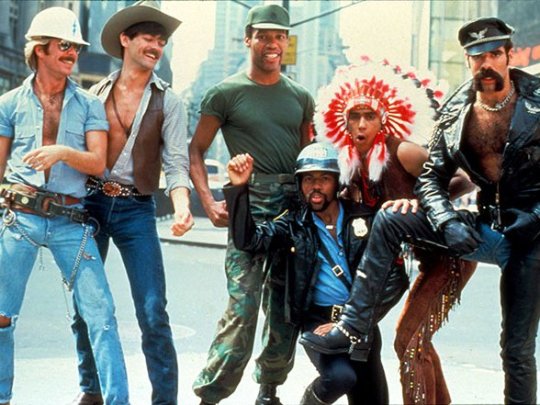
Now the government was already aware of the kind of scandalous sexual behaviour young men can get up to when left to themselves. Two major government programs before the war, the Federal Transient Program and the Civilian Conservation Corps focused on unattached young men, but over time these spaces became highly suspect and the focus shifted to helping family men so as to avoid giving government aid to ‘sexual perversion’ in these homosocial spaces.
But with the war on there was no choice but to put hundreds of thousands of young men in their own world. All male boot camps, all male bases, all male front lines.
The emotional intensity broke down the barriers between men and the strict enforcement of gendered norms.
On the front the men had no girlfriend, wife or mother to confide in. The soldier’s body was strong and heroic but also fragile. Straight men held each other in foxholes and shared their emotional vulnerability to each other. Gender lines began to blur as straight men danced together in bars an action that would result in arrest in many American cities.
Bronski writes, “Men were now more able to be emotional, express their feelings, and even cry. The stereotypical “strong, silent type,” quintessentially heterosexual, that had characterized the American Man had been replaced with a new, sensitive man who had many of the qualities of the homosexual male. (Bronski 152)”
Homosexual men discovered in this environment new freedoms to get close to one another without arousing suspicion.
“Though the military officially maintained an anti-homosexual stance, wartime conditions nonetheless offered a protective covering that facilitated interaction among gay men (d’Emilio 26)”
Bob Ruffing, a chief petty officer in the Navy described this freedom as follows, ‘When I first got into the navy—in the recreation hall, for instance— there’d be eye contact, and pretty soon you’d get to know one or two people and kept branching out. All of a sudden you had a vast network of friends, usually through this eye contact thing, some through outright cruising. They could get away with it in that atmosphere. (d’Emilio 26) ”
Another wrote about their experience serving in the navy in San Diego, “‘Oh, these are more my kind of people.’ We became very chummy, quite close, very fraternal, very protective of each other. (Hegarty 180)”
Some spaces within the army became queer as well. The USO put on shows for soldiers, and since they could not find women to play parts, the men often dressed in drag. “impersonation. For actors and audiences, these performances were a needed relief from the stress of war. For men who identified as homosexual, these shows were a place where they could, in coded terms, express their sexual desires, be visible, and build a community. (Bronski 148)”
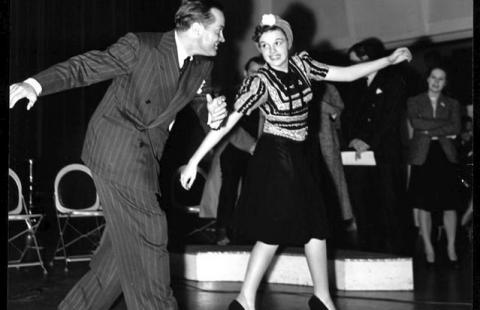
“Here you see three lovely “girls”
With their plastic shapes and curls.
Isn’t it campy? Isn’t it campy?
We’ve got glamour and that’s no lie;
Can’t you tell when we swish by?
Isn’t it campy? Isn’t it campy?”
The words camp and swish being used in the gay subculture and connected to effeminate gay men.
I would have to assume, more than a few transwomen gravitated to these spaces as well.
Even the battlefield itself provided opportunities for gay fraternization. A beach in Guam for example became a secret just for the gay troops, they called it Purple Beach Number 2, after a perfume brand.
This homoerotic space was not confined to the military, but spilled out into civilian life as well.
Donald Vining was a pacifist who stated bluntly his homosexuality to the recruitment board as his mother needed his work earnings, and if you wanted be a conscientious objector you had to apply to go to an objector’s camp. He became something of a soldier chaser, working in the local YMCA and volunteering at the soldier’s canteen in New York he hooked up with soldiers still closeted for a night of passion but many more who were open about who they were.
After the war he was left with a network of gay friends and a strong sense of belonging to a community. It was dangerous tho, he was victim of robberies he could not report because they happened during hook ups, but police were always ready to raid gay bars when they were bored. “It was obvious that [the police] just had to make a few arrests to look busy,” he protested in his diary. “It was a travesty of justice and the workings of the police department (d’Emilio 30).״
Now it might seem odd he was able to plug into a community like that, but over the war underground gay bars appeared across the country for their new clientele. Even the isolated Worcester Mass got a gay bar.
African American men, barred from combat on the front lines, were not entirely barred from the gay subculture in the cities. For example in Harlem the jazz bar Lucky Rendevous was reported in Ebony as whites and blacks “steeped in the swish jargon of its many lavender costumers. (Bronski 149)”
The Other War: Facing Homophobia
“For homosexual soldiers, induction into the military forced a sudden confrontation with their sexuality that highlighted the stigma attached to it and kept it a matter of special concern (d’Emilio 25)”
“They were fighting two wars: one for America, democracy, and freedom; the other for their own survival as homosexuals within the military organization. (Eaklor 68)”
Once they were in, they fell under Article 125 of the Uniform Code of Military Justice: “Any person subject to this chapter who engages in unnatural carnal copulation with another person of the same or opposite sex or with an animal is guilty of sodomy. Penetration, however slight, is sufficient to complete the offense.”
Penalties could include five years hard labour, forced institutionalization or fall under the dreaded Section 8 discharge, a stamp of mental instability that would prevent you from finding meaningful employment in civilian life.
Even if one wanted nothing to do with fulfilling their desires it was still essential to become hyper aware of your presentation and behaviour in order to avoid suspicion.
Coming Home to Gay Ghettos
“The veterans of World War II were the first generation of gay men and women to experience such rapid, dramatic, and widespread changes in their lives as homosexuals. Bronski 154”
After the war many queer servicemen went on to live conventionally heterosexual lives. But many more returned to a much queerer life stateside.
Bob Ruffing would settle down in San Francisco. The city has always been a safe harbour for queer Americans, made more so as ex servicemen gravitated to its liberated atmosphere. The port cities of New York, San Francisco and Los Angeles became the prime destinations to settle. Vining’s partner joined him in New York, where they both immersed themselves in the gay culture.

Other soldiers moved to specific neighborhoods known for having small gay communities. San Francisco’s North Beach, the west side of Boston’s Beacon Hill, or New York’s Greenwich Village. Following the war the gay populations of these cities increased dramatically.
The cities offered parks, coffee houses and bars which became queer spaces. And drag performance, music and comedy became features of this culture.
These veterans also founded organizations just for the queer soldiers. In Los Angeles the Knights of the Clock provided a space for same sex inter racial couples. In New York the Veterans Benevolent Association would often see 400-500 homosexuals appear at its events.
A number of books bluntly explored homosexuality following the war, such as The Invisible Glass which tells the story of an inter racial couple in Italy,
“With a slight moan Chick rolled onto his left side, toward the Lieutenant. His finger sought those of the officer’s as they entwined their legs. Their faces met. The breaths, smelling sweet from wine, came in heavy drawn sighs. La Cava grasped the soldier by his waist and drew him tightly to his body. His mouth pressed down until he felt Chick’s lips part. For a moment they lay quietly, holding one another with strained arms.”
Others like Gore Vidal’s The City and the Pillar (1948), Fritz Peters’s The World Next Door (1949), and James Barr’s Quatrefoil (1950) explored similar themes.
In 1948 the Kinsey Report would create a public firestorm by arguing that homosexuality is shockingly common. In 1950 The Mattachine Society, a secretive group of homosexual Stalinists launched America’s LGBT movement.
References:
Michael Bronski “A Queer History of the United States”
John D’emilio “Coming Out Under Fire”
Vivki L Eaklor “Queer America: A GLBT History of America”
~~~~~~~~~~~~~~~~~~~~~~~~~~~~~~~~~~~~~~~~~~~~~~~~~
The Lesbians
In 1947 General Eisenhower told a purple heart winning Sargeant Johhnie Phelps, “It's come to my attention that there are lesbians in the WACs, we need to ferret them out”.
Phelps replied, “"If the General pleases, sir, I'll be happy to do that, but the first name on the list will be mine."
Eisenhower’s secretary added “"If the General pleases, sir, my name will be first and hers will be second."
Join me again May 17 to hear the story of America’s Lesbians during the war.
21 notes
·
View notes
Text
Feminism vs Female Empowerment vs Feminist Exemplification
In the past years this thread of labeling anything that’s female positive as feminist has really skyrocketed and it bothers me greatly. Great female representation and female empowerment does not make a thing feminist. Something that illustrates, explains or describes a feminist value or point of view does not make that thing feminist.
What defines something as sexist or empowering or feminist is the context and the message or objective that it wants to convey.
There are men in the industry who are progressive and works towards equality by hiring more women, and actively trying to give us better female representation. There are women who direct women in films about women and who try to maintain a crew or team of mostly women. In both cases, none of this makes their project or them feminists.
The majority of the entertainment industry responds and caters to The Male Gaze – it does so even if there are no men operatively involved in the project, because 99.9% of people in the industry do not make art, they are here to make money.

And although it is based on what we commonly call artistic careers, that does not mean that there is a really artistic background or objective in the things being made – it’s purely commercial in a vast majority. The ultimate goal of the entertainment industry is to sell. Therefore, much of this "art" is not progressive, thought-provoking or subversive in any way, specially if the person in charge believes that this could cost them money. The main objective is to market to the consumers and they do so at the expense of everything - this includes quality, values, points of view, consciousness and self-awareness. And this is when two very interesting things happen: Faux Feminism & Female Exploitation.
Female Exploitation is when the person in charge believes that what sells is quiet, beautiful and sensual women – this is the main thing, and the character's story is secondary (so much that most end up being just eye candy or as a manic pixie dream girl). In this case they think of subversive and thought-provoking as something that can harm their income. So the actresses talent and creativity doesn’t really matter, as long as they’re pretty and sell.
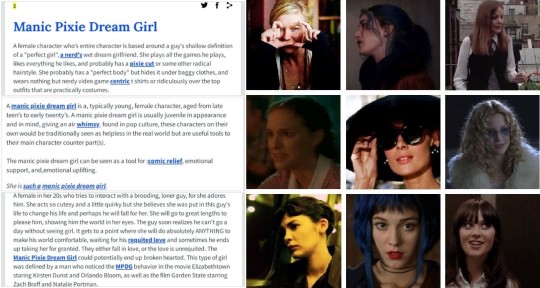
Faux Feminism is when the person in charge believes that the money is in the feminist pov and they make films that could pass as feminist and with strong female characters that follow closely and/or represent the political climate and feminist discourse of today – but that does not make the product feminist, mainly because in most cases they do this in the most superficial way for a monetary gain. Keep in mind, in this cases they don’t explicitally use the word feminism in attachment to whatever their selling, but it’s very obvious.
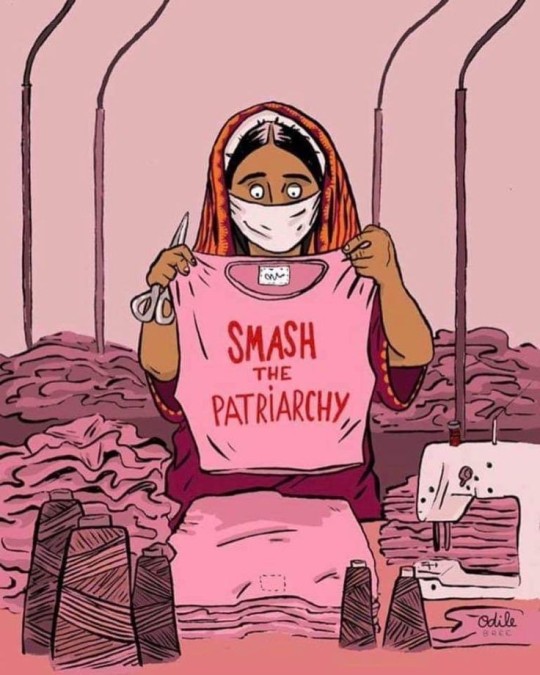
And sometimes is neither of these, but instead Casual Feminism - when something could represent, stand for feminism but that wasn’t the intention at all. Feminists saw it and were like HECK YEAH.
Is feminist a project in which mostly or only women participate? Is feminist a project where the main roles are 99% female? Is feminist a project that addresses sexism? Is feminist a project that’s inclusive? Is feminist a project with independent and empowered women? Is feminist a project that criticizes the way in which society treats women? The answer to all this is NO.
What defines whether something is feminist or not, is first and foremost if whether its exhibitors/creators are feminists or if it was written to represent/stand for feminism explicitly and consciously. If I wear a shirt that says I am feminist, that does not make me feminist. Being a fan of Beyonce, Taylor Swift, Emma Watson or any other feminist does not make me a feminist. Reading one feminist book does not make me feminist (it’s the start, if so I decide). I'm just wearing something, following a person, consuming a product. And many artistic products are attributed the term feminist when they are not in the slightest. If you assume that it is feminist because it exemplifies feminism or is potentially empowering for women, that does not make it feminist. Talking about self-love, girl power, sorority and sexism does not make you a feminist - it makes you self-aware of your rights, strengths and weaknesses and that is excellent and encouraged, but it does not make you feminist.
Why? Because Feminism is a philosophical, social, political, economic and artistic current. What makes a feminist person a feminist, above all, is that they identify themselves as such, with all the awareness of what feminism is because they have studied it or are constantly studying it or have the intention of studying it.
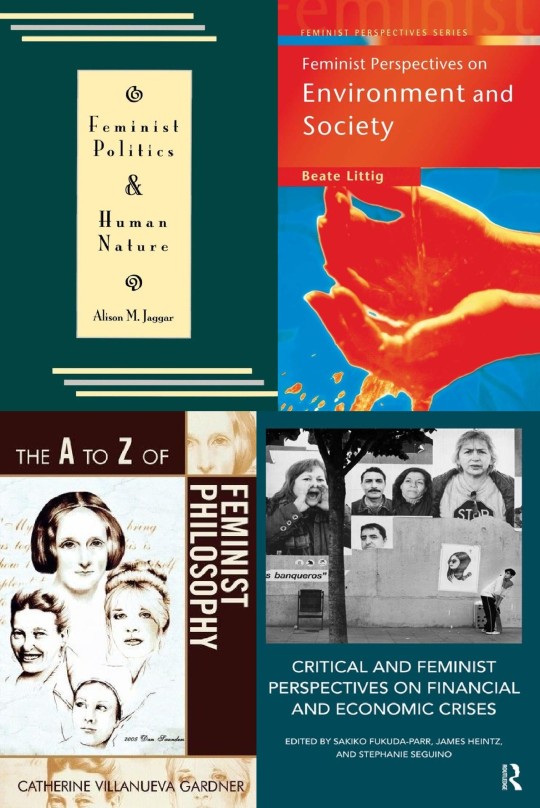
We can long and dream for a feminist awakening in the entertainment industry, but precisely because of that we should not label just anything as sfeminist, because labeling something or someone as feminist when it is not is a disrespect to the person or product and misleading; and it is harmful to the people and products that are feminist and that are mostly ignored, criticized, received in a negative way and usually overshadowed by pseudo-feminist products with better marketing, plus it only helps to preserve the misinformation and misunderstanding of what feminism is and superficializes it. Not to mention it can perpetuate some misconceptions.
Something or someone not being feminist does not mean it is sexist and there IS feminism in the entertainment industry, but very little and it usually suffers from detractors from the industry itself; so what we find mostly is female empowerment, in an initial and often diluted facet.
So no, we can't call it feminist but we can call it empowering since many women feel that spark of strength, they feel identified and reflected accurately, maybe they even feel understood - and that is something very valuable. We can also use them as an exemplification of feminism, there are many artistic projects that are not feminist but serve to explain, illustrate or describe a feminist point of view because they showed it excellently.
Let’s see some examples of what I’m talking about:
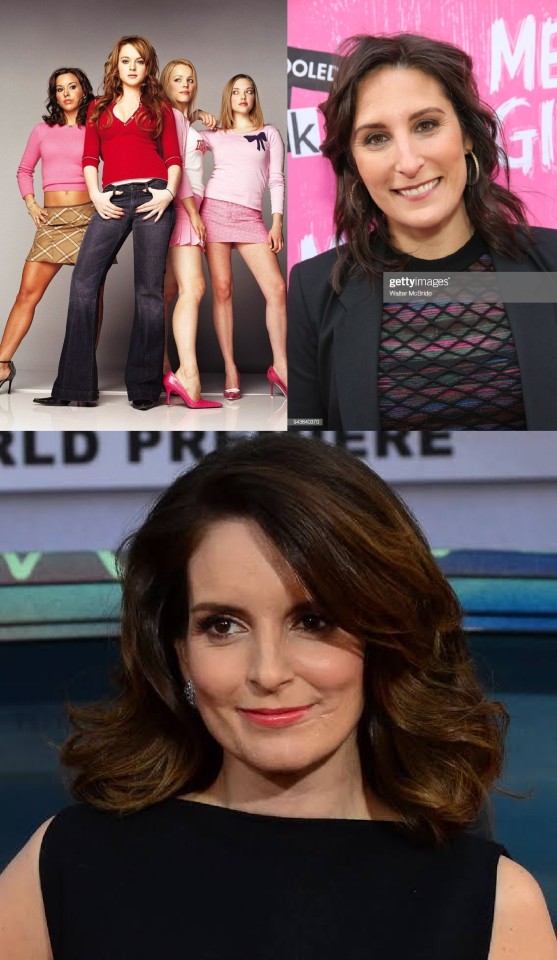
Mean Girls is a great example of a feminist movie. It represents and portrays feminist points of view and feminist values consciously and with the intention and awareness of doing it directly from a feminist stand. It has the feminist label very big and very visibly. It was written by a feminist (Tina Fey), inspired on the novel of another feminist (Rosalind Wiseman). The director is not a feminist, as far as we know, but that doesn’t take away from its value as a feminist piece of work in any manner.
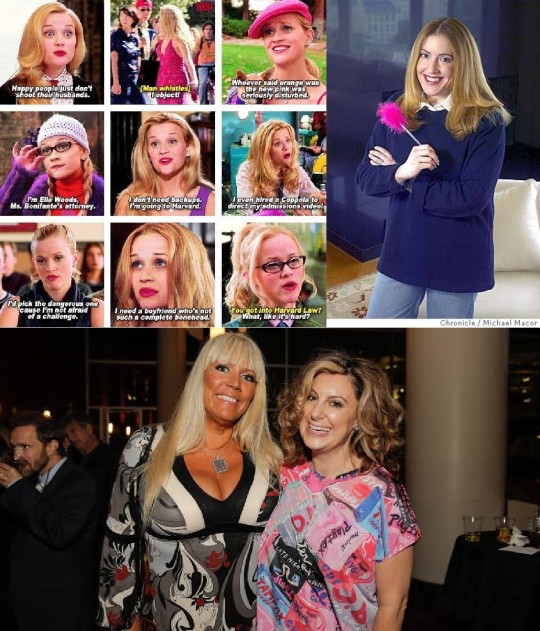
Legally Blonde is another great example of a feminist film. The writers, Karen McCullah and Kirsten Smith are both feminists, Kirsten notably being a Riot Grrrl. It is based on a novel written by a feminist (Amanda Brown). And just as Mean Girls, it represents and portrays feminist points of view and feminist values consciously and with the intention and awareness of doing it directly from a feminist stand. It has the feminist label very big and very visibly. Also, it is very female empowering.
Now let’s talk Harley Quinn, because is a very interesting one.
First, let’s talk about her in the comics. She wasn’t created by feminists. She isn’t coded as feminist. She is not written as a feminist character. She is not female empowering for most of her story. Nor she or her story are an exemplification of feminism. The character is not meant to represent or embody feminism in any way. So is she a feminist character? No.

Now, in the movie Birds of Prey. Again, she wasn’t created by feminists. Was the script written by a woman? Yes, but not a feminist woman. Is the movie directed by a woman? Yes, but again, not a feminist woman – the director even said in an interview that she didn’t want to “sound too much like a diehard bra-burning feminist”. The film had an all women crew. Again, Harley isn’t coded as feminist - she is not written as a feminist. The character is not meant to represent or embody feminism in any way. BUT is it female empowering? HELL YES. And the movie as a whole is a great exemplification of feminism, this is another quote from the director: “a harlequin’s role is to serve, they’re nothing without a master and so the movie is about Harley Quinn becoming her own master. And not just Harley, but the Birds of Prey as well. All these women go through something and they’re all trying to break free from their own chains”. So is the movie feminist? No, and so are not it’s characters. But we can and should embrace and celebrate Harley Quinn from a feminist point of view.
Is Hermione Granger a feminist character? No. But she is female empowering and an exemplification of feminism. The actress who plays her, Emma Watson, is a feminist but that doesn’t magically makes all the characters she portrays feminists or well written female characters.
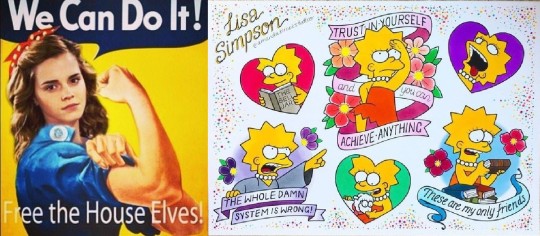
On the other hand, Lisa Simpson IS a feminist. Is the voice-actress a feminist? I don’t know. Are the creators feminists? I dont know either - but it doesn’t matter because Lisa is a feminist and she is explicitly portrayed and written as such, she voices feminism and is meant to embody and represent a feminist (even if it’s an 8 year old one) – and she does so very well if I might add.
So stop calling everything “feminist” and stop telling people that if they believe in equality they are inherently feminists even if they dont want to use that label themselves, stop this specially towards people (I’ve seen this in comment sectons). In my experience, there are three types of women who refuse the feminist label:
1) The Closeted Feminist: a woman that’s not afraid to speak up about their opinions but doesn’t describe themselves or their povs with the word feminism even though their arguments and discourse has a feminist stand that is based on feminist theory to the point where it’s obvious this person has immersed themselves in feminist books, podcasts, films, documentaries, etc – this could be because labeling oneself as a feminist is dangerous. Either in their house, or in the society they’re a part of – and with this I mean that it could actually lead to abuse or active persecution. Not everyone has the same freedom, background and opportunity you do.
2) The Double Agent: they say they don’t need feminism and they don’t believe in it but they still stand for equality and justice. Usually this person doesn’t really understand what feminism is because they have never cared to learn about it and yet they go round commenting on feminist blogs about “how feminists are wrong” – this person believes the patriarchy’s version of what feminism is. This person is aware of the injustice and inbalance but thinks feminism is sexism towards men, hatred of men and that is used for women as a women-victimizing campaign to get pity points and advantages. This are the people that said Taylor Swift played the victim for 13 years.
3) The Free Woman: she doesn’t believe in feminism, she probably voices hate towards feminism and feminists and thinks very low of them because “she doesn’t need feminism” because she loves the men in her life and has “never suffered sexism” first hand so it doesn’t exist. The Free Woman and the Patriarchal Feminist have in common that they feel feminism victimizes women and is sexism towards men. The difference is one thinks inequality is a myth and the other one knows it’s still a thing.
If ya’ll read all of this KUDOS TO YOU and THANK YOU. I’ve been thinking about this for almost a year and it took me a long time and effort to write this and put my thoughts into words cause I’m really bad at expressing myself and lack communication skills. I’d like to write too about the difference between Feminist Icon – Feminist Woman – Iconic Women, just because I’m tired of that mess too.
#feminist#feminism#faux feminism#female empowerment#female representation#long post#very loooooong post#legally blonde#mean girls#harley quinn#birds of prey#hermione granger#harry potter#lisa simpson#the simpsons
1K notes
·
View notes
Text
Kylux and the Queer Literary Tradition
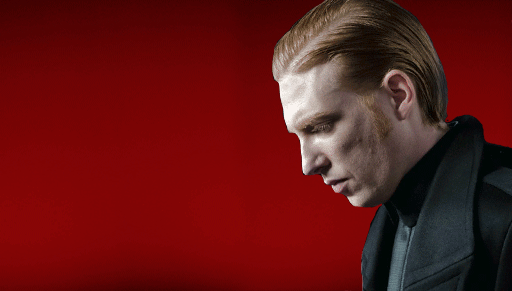
So, I have seen a lot of people talk about Kylux in terms of queer fetishisation or even labelling it a “crack ship”.
The discourse has somehow made Kylux out to be this straight-girl fantasy where two men are simply shipped because they are white and handsome. Such an unfavourable interpretation completely takes away from many Kyluxers being queer and/or poc themselves as well as shaming straight people for seeing queer potential where it’s not canonically stated to be. Since the comic came out, there has been much elation because it finally “confirms” some of the things that appeal to Kyluxers, therefore justifying the ship. I don’t think, however, that Kylux has ever been anything but rather conventional in its queer subtext. Kylux falls in line with a long tradition of homoerotic aggression between two men. I will try to put this into words as eloquently as I can.
First, let’s talk about how Kylo Ren/Ben Solo and Armitage Hux are queer coded on their own before moving on to their relationship.
Armitage Hux is almost comically queer coded. The act of feminising a villain to subtly convey to the audience that he is gay and therefore “morally reprehensible” has been a practice since the Hays code era (in some respects even before that -as the Victorian Age marks the beginning of our modern understanding of gender and subsequently, its subversion). He is seen to be physically weak, petty, moving and snarling and “bitching” in a way society would stereotypically ascribe to women.
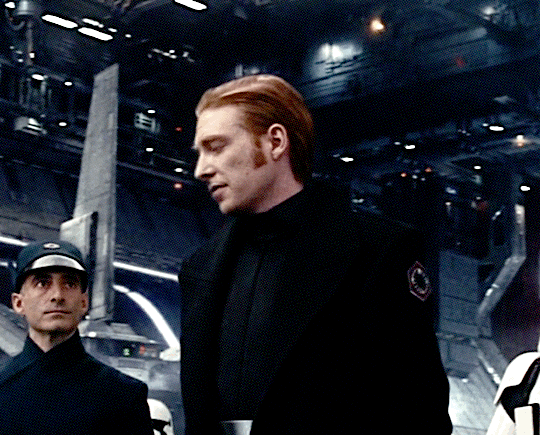
His British Accent, at least from an American point of view, already marks his sexuality as ambiguous. This is not helped by the fact that he speaks in an abnormally posh way, alienating himself from the common people.Hereby, the movies draw a well-established line between decadence/queer and pragmatic/heteronormative.
In the “Aftermath” trilogy Brendol Hux states his son to be “weak willed” and “thin as a slip of paper and just as useless”, robbing him of his masculinity – no matter how ridiculous of an endeavour this is when talking about a four-year old boy. Hux is very early on criticised for not fitting into a socially expected form of manhood. This is especially evident when one compares him to his resistance rival, Poe Dameron. Now, Dameron has his own set of queer coding, but he is shown to be what is commonly viewed as “acceptably queer”. He is masculine, trained and proactive. When he ridicules Hux at the beginning of The Last Jedi, there is this juxtaposition of the helpless, feminine villain and the dashing, superior male hero. Hux is supposed to be judged as vain and arrogant while Poe takes risks and although reckless, is somehow to be admired. Further, Hux is constantly abused. He is thrown into walls letting out high pitched screams, runs away in the face of danger (as seen in the recent comic) and is pushed around by his own subordinates. His strength lies in being cunning and calculated, not stereotypically masculine virtues.
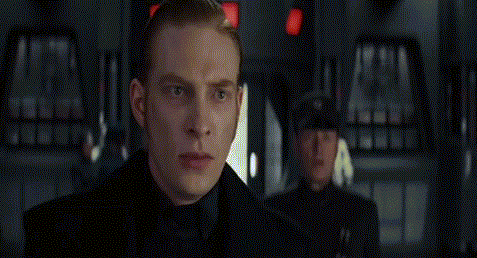
Hux’s destructive powers, his monstrosity so to speak, also follow a long-standing tradition of queer villainization. Harry Benshoff’s The Monster and The Homosexual articulates this as follows:
“[...] repressed by society, these socio-political and psychosexual Others are displaced (as in a nightmare) onto monstrous signifiers, in which form they return to wreak havoc […]” (Benshoff 65).
And what other, than a socio-political Other, is Armitage Hux - the Starkiller?
Kylo Ren/Ben Solo, too, is touched by the mark of queerness. It is no coincidence that despite his raw power and muscular physique, Kylo Ren has not been adopted by hegemonic masculinity in the same way Han Solo has, for example. When the logical is traditionally seen as masculine, the realms of pure and unfiltered emotionality is feminine. And Kylo Ren is unrestrained in his vulnerability, his tears, his pain – People make fun of the dramatic ways he gives words to his feelings precisely because it is regarded as weak, as whiny, as “womanly”. His long curly hair, full lips and dress-like costume only strengthens this impression. Kylo Ren is an amalgam of masculine aggression and feminine expressiveness. Some of his outbursts even remind of the pseudo-illness of hysteria. The gendered lines are blurred and unclear in Kylo Ren, diffusing any efforts to appease the binary. Benshoff describes this as a form of queer existence which does not only constitute itself in opposition to what is considered normal but “ultimately opposed the binary definitions and prescriptions of a patriarchal heterosexism” (Benshoff 63).
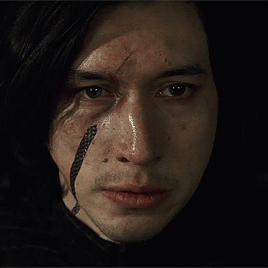
Both are not easily categorised. They are patched up by multiple, gendered signifyers. Kylo Ren’s masculine body in contrast to his femininized fashion. Hux’s slender body with his stiff and masculinised military get-up. Hux’s toxic tendency to avoid showing his emotions while also being shown as weak, womanly, cowardly. Kylo Ren is an excellent warrior, yet simultaneously being prone to emotional outbursts. Jeffrey Jerome Cohen’s famous work Monster Theory (Seven Theses) elaborates upon this further, while acknowledging that queer figures are most commonly depicted as the monstrous Other:
“The refusal to participate in the classificatory “order of things” is true of monsters generally: they are disturbing hybrids whose externally incoherent bodies resist attempts to include them in any systematic structuration.” (Cohen 6).
Nonetheless, many queer people feel empowered by these figures. Lee Edelman theorises in his polemic No Future: Queer Theory and the Death Drive about the nature of queerness as a force of cultural resistance. According to Edelman, the queer must always refuse societal expectations of a perpetual future and embrace the death drive instead. In this sense, queerness stands in direct opposition to futurity as it negates any meaning in sexual reproduction and marriage (cp. Edelman 13). When Hux destroys planets, when Kylo Ren proposes to burn it all down “The Empire, your Parents, the Resistance, the Sith, the Jedi”, they are not merely killing the past. They are also negating the worth of categories that make up future and present alike. They are resisting the heteronormative values of production.

Now that we have the puzzle pieces that illustrate how Hux and Kylo are queer figures in on themselves, it might be interesting to examine how they work together.
In her text “Epistemology of the Closet”, Eve Sedgwick talks about a common gothic trope where two men are caught in a feud full of mutual hatred. In this case, both men are mirror images of one another, making them especially vulnerable to the other’s advances: "[…] a male hero is in a close, usually murderous relation to another male figure, in some respects his 'double', to whom he seems to be mentally transparent."
Kylo and Hux are very clearly mirrors of one another. Aside from the gendered oppositions I have already illustrated, they are each other’s double in every sense of the word. Born on opposite ends of an age-old war. Both caught in complicated relationship with their fathers whom both have killed out of opposite motivations (loving them too much vs. hating them with a passion). They represent the opposite ends in the binaries for logic vs. spirituality, restraint vs. wildness, control vs. sensuality, technology vs. nature etc.
This shot from The Last Jedi shows both of them mirroring each other visually, henceforth strengthening this impression.
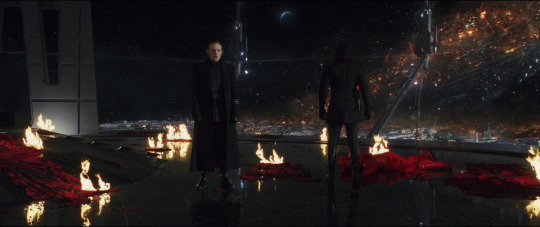
They are "mentally transparent" to each other, because they are different sides of the same coin which Snoke tossed around to his whims. Even their aggression takes on erotic forms. It is hard to deny the homoerotic implications in choking another men to make him submit, forcing him onto his knees. The breaching of personal spaces and looming over each other, the obsessive need to prove one’s own worth to the male other with which one is engaged in a homosocial bond:
“The projective mutual accusation of two mirror-image men, drawn together in a bond that renders desire indistinguishable from prédation, is the typifying gesture of paranoid knowledge.” (Sedgwick 100).
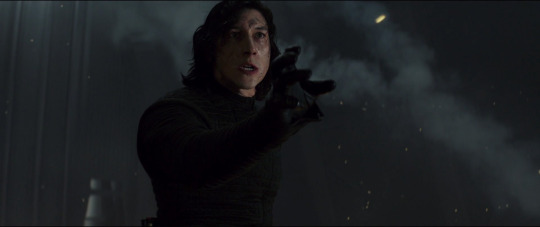

And through all of this, I have not even talked about the collaborative potential between the two of them. Their instinct to protect one another despite insiting the opposite. How both of them could overcome their trauma by engaging with the other, who suffered so similarly under family obligation and Snoke’s abuse.

Works Cited:
Benshoff, Harry: “The Monster and the Homosexual.” In: Harry Benshoff (ed. and introd.)/Sean Griffin (ed. and introd.): Queer Cinema, the Film Reader. New York: Routledge 2004. Pp. 63-74.
Cohen, Jeffrey Jerome. "Monster Culture (Seven Theses)." Jeffrey Jerome (ed. and preface) Cohen: Monster Theory: Reading Culture (1996): 3-25.
Edelman, Lee. No Future: Queer Theory and the Death Drive. ,2004. Print.
Sedgwick, Eve Kosofsky-Sedgwick. Epistemology Of the Closet. Berkeley, Calif. :University of California Press, 2008.
#Kylux#Armitage Hux#Kylo Ren#Ben Solo#General Hux#Hux#Benarmie#Kylux meta#sw#sw meta#sw analysis#tfa#tlj#long post#long text#hux comic#huxlo
3K notes
·
View notes
Text

Ch. 2
Pairing: Greer x Lancelot
Tagging: @plumpblueberry @thetwinkims @sakura-1819 @ikemen-lover159
A/N: Wow it’s been a hot minute since I wrote the first chapter of this. I meant for this chapter to introduce her to Edgar and Zero as well but then her and Lance had some alone time and I decided to end it on a fluffy note. Next chapter, there will be angst XD
[25 Days of Christmas 2020 Voting]

“Excuse the intrusion.”
The three maids assisting the young woman in dressing and straightening up the room, gave a respectful bow and made themselves scarce. Greer easily recognized him. After all, her brother complained about him in every letter he wrote her when he still served in the army. “Good morning, Jonah.”
“Yes, good morning, Mrs. Kingsley.” The way he spoke sounded forced. He wasn’t pleased with the secrecy of the arrangement and it likely bothered him that she bore the Atlas name before taking Lancelot’s.
“There’s no need for formalities. I’d prefer to be called Greer.” She offered him a warm smile, fiddling with the ring awkwardly snug around her finger.
Jonah gave a curt nod, dutifully doing as asked of him. “I’d like to escort you to breakfast in the dining hall.” He had plenty of questions that he needed answers to. King Lancelot had refused to speak of it, only giving orders to make sure Greer was treated well.
“That would be lovely. Thank you.”
Greer had few memories of Jonah, only seeing the man from afar. Their family’s cordial and she was sure that she’d spoken to him a handful of times, if only to say hello. She did remember that he could always be found with Lancelot, his admiration going all the way back to childhood.
From the upstairs window, the training yard below held a unit of soldiers headed by one of the other Chosen Thirteen. The woman paused, drawn in by the uniformity and focus. “I’ve never seen it so closely.” Her brother preferred for her to be kept at a distance.
“As the King of Hearts wife, you should familiarize yourself with certain subjects, including the army.” Jonah observed her fascinated features. How many women had he walked down this hall for audiences with his King? All had complained about the headquarters or pretended that they weren’t in the presence of soldiers.
Greer didn’t find this place frightening.
“Yes, I agree. I have much to study.” Her golden eyes turned from the training yard to the Queen of Hearts, finding his amber ones. “Would you recommend some documents and books? I would greatly appreciate any assistance. I know so little about this part of Red Territory.”
Jonah was certainly surprised. She genuinely wished to rise to her new position, not something that most high-born women would agree to. “Of course. Whatever you need, I shall arrange for it.”
Honestly, she was nothing like he had been imagining. Sitting across from her in the dining hall, Jonah could find little fault in her manners and etiquette, although it was taught to all who bore a Chosen Thirteen family name. She gracefully answered each of his questions without becoming defensive or annoyed, as most did.
“Why did you marry King Lancelot?”
The undertone of the question really asking: why did your family push for this arrangement? For power? For higher status?
One that Greer knew she’d be answering time and time again. Most of the highest families in Red Territory wanted a clear line of succession into the army, so there wasn’t too much intermingling of the Chosen Thirteen’s families in the marriage aspect. Alliances were one thing but claims to certain seats in the army were expected to be clear.
And as such, an Atlas marrying a Kingsley had caused an uproar, especially with their seat forfeited to a man that had no pedigree.
Greer set her teacup onto the saucer without a sound, quietly considering the question before speaking. “Wouldn’t it be lovely to say that we married for love?” She posed the question with a weak smile. “But it’s never so easy.”
The Queen of Hearts waited in silence. He hadn’t gotten a satisfactory answer from Lancelot, instead being told that the reason was irrelevant. The younger Atlas nothing like he’d imagined. Not at all like her elder brother. Jonah might even admit that he found her a good fit for his King, but it depended on this very important question.
“I don’t believe that I can give an answer that will suffice. Lancelot needed a bride to calm the fighting in his family, and I needed a husband for the same reason. It’s as simple and complicated as that.” Greer paused, squeezing her hands together in her lap.
“Then I am correct to assume that your family wants a claim to the King of Hearts position.”
The young Atlas nearly nodded. It was the truth, one that wasn’t hard to figure out. “What my family wants and what I want are not in alignment. Lancelot is aware, as well. It’s quite selfish, but I said yes to the marriage as a means to escape the Atlas family. Lancelot has promised to keep me safe.” Or at least, that is what Greer wanted to believe. The influence of her family would not be easily escaped. Even at the headquarters, they would find a way to get to her.
They wanted a child, a way to extort the Kingsley family for power and status.
Greer simply wanted to be happy, something almost unattainable in the world she resided in. Something that she had yet to experience. Mousse had escaped. He found purpose in being a diplomat. The family had shunned him, blaming him for shaming the Atlas name.
She couldn’t admit that her family still had their claws deep in her. Even though she knew how they would view her and Lancelot’s child, Greer thought she would be thrilled to be a mother. And yet, how much of that want was her own?
“I see.” Jonah observed her for a moment longer. There was no ill intent on her part. He would personally look into her family and do whatever necessary to protect his King and his new wife. He cast a glance at the clock and rose silently from his seat. “If you require anything, please ask and it will be done.”
The kitchen staff swiftly removed all the dishes from the table. Their curious gaze flickering to the woman, all having heard the rumors of Lancelot’s bride. They scurried back to the kitchen to gossip, but their whispers weren’t quite low enough to evade her ears.
I heard the Atlas family practically has been begging for her to be married for years now.
The family may be disgraced but I feel bad for the poor girl having to marry into the Kingsley family. Everyone knows that King Lancelot is cold-hearted. I bet she’s miserable.
I’ll wager he gets rid of her before the end of the month.
Don’t say that! You’ll get in trouble with the head chef!
But it’s the truth. He’ll send her away and some tragic accident will befall her--
“Excuse me. May I have another cup of tea?”
All three heads swiveled toward her voice with varying degrees of shock and embarrassment, having been caught. Jumbled apologies spilled from their mouths as they bowed respectfully. “Of course, just one moment-”
“I’m surprised you’d speak so poorly of the King of Hearts.” Greer watched them visibly shrink at her words. It wouldn’t do to have rumors spreading about a weak wife. It would only cause discourse and put her in danger. Their silence prompted her to continue. “It would be wise to consider more carefully before so casually spreading false information.”
The three were moving around the kitchen stiffly, unable to look directly at her.
“I do appreciate the worry for my wellbeing.” She twisted their words with expertise expected of her status in the territory. Although she would not hold quite as much power as any man, there was still a healthy amount of respect to be given to the wives. Greer would not be needlessly cruel, but she wouldn’t allow there to be rumors of her painted as weak and pitiful or rumors of her husband treating her poorly. “However, there is no evidence of any ill treatment, and you’ll do away with such speech whether in the presence of us or in secret.”
Putting to rest this distance between the couples would be best.
“I’ll hear nothing else of this. Our marriage is not subject to your petty grievances. You will be respectful of both King Lancelot and I. Am I understood?” Greer had no reason to raise her voice. Her words stood on their own without the volume.
Many talked about how Lancelot was cold and aloof. The women who were rejected by him would gripe endlessly at cordial parties but would attempt it again and again. Staff that had served in the army spoke in a similar fashion. As if they had any idea what his position took from him, what he must do in order to protect and serve Red Territory.
Much of which Greer had little knowledge of but vowed to learn so that she could better support him. Their public image had to be maintained, otherwise they became targets to tear down in order for others to gain power.
The last thing they needed was more enemies.
“Here you are, Lady Greer. We sincerely apologize for our carelessness.”
Satisfied with their remorse, she accepted the cup and went on her way. The moment the dining hall door closed behind her, she leaned back against it. A soft sigh passed her lips. This would become a regular occurrence, she was sure. At least she’d had the practice of explaining her brother’s departure from the army to those who criticized.
The layout of the building just as Jonah described to her. Soldiers passing her in the hall gave curious looks. It was tiring, but they had to courtesy to whisper after she’d gone by. They wouldn’t dare blaspheme their King.
Greer found the office with little trouble. The cracked door easy to slip through and she found Lancelot at the desk, alone, with a stack of documents. Clear blue eyes rose when she placed the cup of warm tea in an empty spot.
“You don’t need to trouble yourself with bringing me tea.”
“I wanted to.”
Lancelot set his quill down, plucking the cup from the saucer to take a sip. “I heard you had trouble with a few of the kitchen staff but handled it well.” He nearly laughed at the way her brow knitted in confusion.
“How did you already hear about that? It was only moments ago.” Greer couldn’t call seeing anyone leave the office that would have knowledge of that. The staff themselves would never admit to their blunder, lest they lose their job.
“There’s little that happens here that I don’t know about. You shouldn’t bother yourself with such nonsense as idle gossip. I’m in no need of protection.” He’d grown quite used to the rumors surrounding him. His wife would be subject to the same treatment, and he’d known that before agreeing to a marriage.
She brushed a strand of brown hair away from her face with a gentle smile. “Perhaps not, but it’s us now, together. The more we allow people to pry and insinuate, the more problems that are going to arise. I was simply putting out the sparks to a potential fire.”
Rumors about either one affected the other.
Lancelot could honestly say that he hadn’t expected her to react in the way that she did. There were two kinds of women in high society that he’d come across. The ones who wielded their power above others to entertain themselves, and the quiet ones who found their identity solely in their husband, choosing to blindly follow.
Greer was neither of them.
And he quite liked that about her.
“Would you like to join me for a walk?” He’d surprised himself by asking that. His better judgement failing him. It would be safer to keep her at a distance. This arrangement only for show, to satiate the wolves for the time being. But, after witnessing her display through the mirror, Lancelot desired a little more time with her.
The air outside brisk even in the late morning. It held little bite, but it was enough to cause the young woman to shiver. Fall had descended on Cradle, turning the green into brilliant shades of orange, red, and yellow. The sun shining down on them aided in a little warmth.
“You seem to have made quite the impression on Jonah, as well. It’s only your first day here.” His Queen of Hearts shuffling around the topic in their meeting, praising her and calling her well-suited for the position she now held. He hadn’t expected her to do so well.
Greer lightly laughed, tugging her white cloak a little tighter. “Jonah is exactly as I imagined he’d be. Mousse wrote about him often. He’s loyal and strict but he cares deeply for his country and for you.” Golden eyes turned upward to meet his, a gentle smile on her lips.
“Yes, he does. Approval from him is a difficult task and yet you received it with one conversation.” The leaves crunched beneath his boots. Of all the proposals he’d received, Greer remained the one that wouldn’t leave his mind. She was kind and fair, smart but willing to expand her knowledge, and today he’d learned that she also stood up for herself and him. She continued to surprise him at every turn.
“Oh, I wouldn’t say that he approves of me. Just that I’m a few steps above my brother in his eyes. It’s going to take time for the people to accept me and accept us. We’ll have to work quite hard to gain public support.”
The King of Hearts hummed in agreement. Even if their marriage was one of necessity, there were still hurdles to overcome. Their lives would be picked apart. They’d be forced to prove their affection and commitment to each other, especially since the wedding happened in private and so quickly.
He was brought out of his thoughts when she took his hand in both of hers.
“We both want the best for Red Territory, and for now, I think that’s enough to make this work. I meant what I said at the altar. I’ll do everything within my power to help achieve the peace in Cradle that you’re striving for.” Playing the dutiful wife had been her families plan, but Greer wanted to be more than that. She would be whatever he needed.
Lancelot didn’t doubt her sincerity, not the first time she said it nor now. “Yes, I’m quite sure you’re willing, but I’m not going to risk putting you in harm’s way. There are going to be times that I cannot allow you to assist.” The defiance in her golden eyes was unusual for a new bride, but he didn’t dislike it. “However, there are matters of my family that need to be settled and you will help me quell the fighting.”
Her shoulders relaxed and a satisfied smile tugged at her lips. “Of course.”
Greer didn’t know why he’d done it. Was it the soldiers watching as the patrolled the grounds, or the staff peeking through the windows? It was likely for show. To prove to the onlookers that they were, at least on the outside, a committed married couple.
And yet, it didn’t feel so empty. His warm lips against hers, a tender kiss that drove away the cold from her body and replaced it with fire. His arm around her waist to hold her body against his, giving a sense of safety and comfort. He lingered, giving her heart a little too much to hold onto.
She didn’t love him, nor did he love her, but…
Greer imagined she could get addicted to this.
#ikemen revolution#ikerev#lancelot kingsley#greer atlas#jonah clemence#red army#there are beauty and beast undertones coming#its just a slow process#also please vote in my 25 days of christmas!
29 notes
·
View notes
Text
Here’s me trying to stay out of discourse after the influx that came with discussing Kagura a few weeks ago, but here I am with more takes. I can’t help it when it comes to Kyo though. I’m way too passionate.
Some of ya’ll informed me about those anti Kyo/Kyoru posts and asks. It genuinely was upsetting to see. Which does feel awkward to say because this is a fictional character. It’s not like they’re insulting my mother lol. It is admittedly a bit hard when it’s my favorite character that I love so much. But I’m not saying that everyone has to love him. Not when we’re all drawn to different characters for different reasons. That’s what makes opinions interesting. However, calling him a douche, dick, and asshole was a little much but I digress.
The biggest thing that had my stomach turning was the “If he changed in the manga because he loves Tohru then that’s bullshit” and, as I said, opinions are fine even if they differ from mine but this...this is just straight-up not factual. I don’t know if they read the manga or haven’t and have only heard he changed and assumed it was because Tohru fixed him. I hope it’s the latter because if it’s the other, we did not read the same manga.
One of the best things about this romance is that Tohru didn’t change him with her love. I’ve read so many books with that trope and, believe me, I hate it. It’s unrealistic and a toxic way of viewing a relationship. There’s a lot of evidence that shows that that’s not what prompted Kyo to grow. He even states it in episode 9 of season 2, “She didn’t take up all of my pain. She didn’t fill in all the brokenness. But those weren’t important. The most important thing was that she stayed by my side.” Tohru never actively guided him to change. She never told him what to do or corrected him when he was wrong. And her love never changed him. What it did do was help him cope.
Kyo was so bogged down with insecurities and sorrow that he needed someone to just simply be with him and be his light. Tohru was able to do that and there’s nothing wrong with that. She listened to him when he needed to let his frustration and pain out there and just gave him a shoulder to cry on without saying “okay here’s what you must do to get over this.” Because that’s not like Tohru anyway. She’ll only give words of encouragement and let others come to their own decisions. Mutual support is anything but toxic so to put it simply...I’m confused.
Yes, Kyo was temperamental and mean before but he grows. We need to see a character start at rock bottom to see their growth. Is he rude to Tohru at first? Yes because he’s not used to interacting with other as he admits in episode 2. At least he’s self aware and knows he needs to fix this. And he does just that. He tries his best to reign in his temper throughout season 1, having slip ups now and then, but he’s human. I wouldn’t expect any character or person for that matter to go through years of constant hatred then suddenly pull a 180 and become a nice person all the time. Realistically, it would be a gradual process of change as they work to better themselves.
He had also been through so much trauma and yeah I know “you can go through trauma and still not be an asshole” but here’s the thing, trauma effects us in different ways. We may keep things bottled in and put on a fake smile, like Yuki, or show our frustration outwardly and take it out on others, like Kyo, but both reactions are valid. I wouldn’t want someone to remain a jerk forever even though they’ve had a hard life. I don’t think that’s justifiable of their actions if they use trauma as an excuse to be a horrible person. But if they’re actively trying to change like Kyo is doing and recognize their faults, I don’t think there’s anything wrong that. Most of us don’t like how our trauma has shaped us into what we are today, but we can strive to fix that. That is Kyo’s journey.
I know he’s a fan favorite and the ppl who hate him are so few so I’m really not that triggered lol. Just a tad bit disappointed especially since I feel like the way this person described him was so far removed from the Kyo I know but one person’s opinion isn’t going to derail me. I just wanted to give my viewpoint to anyone who thinks he’s toxic. I know some think he is based on the fact that he hit her during the true form arc but that was the only time he ever physically hurt her and it was during a moment of weakness during an anxiety attack. He never hurt her again after that. I don’t think there’s anything wrong with that either.
Anyway there’s a viewpoint from the other side for anyone who it might interest. *mic drop*
#fruits basket#kyo sohma#fruits basket discourse#didn't respond to this person because I just wanted to say my piece#and leave it at that#i don't want to argue over it#that'd be too upsetting honestly
78 notes
·
View notes
Photo

this amazing art is by @von--gelmini aka @starker-stories inspired by the divine art of @starker-sorbet.
Chapter Two: Fifteen
3. The Dream
But when Tony sat upon the bed Peter pulled back a little, startled by a shiver of fear. He hadn’t noticed, up until that moment, what his friend had been wearing, and found himself unnerved at the sight. There was nothing frightening about the shirt itself, it was ivory white, the same color as the roses (the same color as the bedcover) with billowing sleeves and a frilly collar that was currently open, exposing his pale white chest. Peter couldn’t say why he was suddenly afraid. Only that Tony had reminded him of something just now, something that had made him very nervous…
“They all have one motion; all jointly move from east to west in twenty-four hours upon the poles of the world. Or so the wise men said. But the wisest of men spoke in freshmen’s suppositions -- none were so wise as Master Peter. Lie beside me and tell me more. Hath every sphere a dominion? An intelligentia?”
Peter stood, silently. This was a bad dream, only Peter couldn’t remember exactly why. Something about the shirt that Tony was wearing. Something about the windows in the stone wall that looked out onto the nightsky, because this castle was on a terrible precipice, and if he were to look out of those windows he’d be looking down at a sea of green tree tops with silver threads where the rivers ran through the forest… they ran across the forest… it was across the forest that was the problem, he was sure of it.
“Be brave, Peter.” Tony was whispered again. And when Peter looked into Tony’s dark eyes, he knew that he could.
Or at least he would try.
He wasn’t sure he would succeed, but when he looked into Tony’s eyes, he also knew he couldn’t say ‘no.’
But it didn’t comfort him at all to find, as he toed off his shoes before climbing onto the bed, that he was wearing the exact same outfit as Tony; tight black pants and a billowing white shirt and a collar that was opening up, exposing his throat, his shoulder, his chest. He was trying to remember why that was a bad thing even as Tony pulled him into strong, solid arms. He leaned his head to rest on Tony’s shoulder, taking a deep breath, trying to stay calm. Tony smelled of burned incense and warm earth. He tried to be brave.
Then Anthony slipped one hand into the open collar of his shirt and Peter gasped in surprise.
“No! This is a bad dream! We’re in Transylvania! This is Castle Dracula, Tony look!” He grabbed the man by shoulders in terror, his heart pounding in his chest, his head jerking around frantically, taking it all in. Oh course… it was all so obvious. The tall black windows. The battlements, jagged against the sky. The many shadows.
“I know this dream, I’ve had this dream before, this is going turn into a nightmare and I’m going to lose you.” He buried his head in Tony’s embrace, afraid to look around the room anymore, knowing he would see something terrible. Somewhere very close he could feel it, the much younger boy that had stayed up passed his bedtime reading that book until VERY late at night alone in his house, afraid to shut the book, afraid to close his eyes, afraid to move from that spot until Aunt May and Uncle Ben returned.
But Tony’s arms were solid and unmoving. He held Peter against chest and murmured to him, stroking his hair and arguing with him gently. “Hold to me Peter. Hold fast. Hold close. Stay with me. I conjure Master Peter and do not release him. Fear not, Master Peter, but be resolute. By the uttermost magic I bind you to me…”
“But that’s not real,” Peter scolded. “That’s not even in Dracula. Even if it were real in this dream it won’t stay real for long. Because dreams turn into… I told you Tony…”
“Look to me, look to me,” Tony crooned, stroking Peter’s back with strong hands, finally resting his head against Peter’s hair, shushing him, almost rocking him, until he allowed himself to be gentled. Peter leaned into the warm embrace. It was a wonderful feeling. Even if this moment faded into something else, it was a moment he would remember.
“Whatever you want to tell me, tell me quick. I can’t make it last. Please Tony.”
Tony lay his mouth against Peter’s ear, scraping his beard across Peter’s cheek. Peter shivered at the touch.
“You need not fear. I am the master of this place. We can speak, dispute, have discourse one with another here. We spoke so little in the dreams when you first called unto me, for then I was so weak, and you were a magician unskilled. Do you not see that we are stronger now?”
“I’m not a magician at all,” Peter whispered. He wiggled a little and Tony loosened his arm a little, looking down into Peter’s face.
“But you are the Master Doctor, master of all arts, the one who named me. Who feeds me his light, but does not know of it. I will instruct you now.”
He guided Peter into a sitting position (Peter had been laying back in Tony’s arm, looking up at his face, thinking that he was wrong, this was in fact the best dream in the world) and looked closely into his face.
“Do you fear?”
Peter thought for a moment, then shook his head.
“I must feed of your light. ‘Light’ is not a fit word. Likewise is not ‘feed’ the fit word.” Gently he scraped the pad of his thumb across Peter’s lips. “There are no fit words.”
“But I can show you…”
Gently Tony slipped a hand into Peter’s open-necked shirt and moved it aside and, just as gently, pulled Peter against his chest. Breathing against Peter’s throat for just an instant, he covered the pulsing vein with his mouth and began to suck. Peter’s heart pounded against Tony’s chest. He tried to remember to breathe.
Soon then were laying together on the bed, Tony moaning and stroking Peter’s back with strong hands. His back, his waist, sometimes down the sides of his legs. Peter clung to him, trying not to moan as well. Sometimes he would push Tony away and Tony would always comply, (eventually) laying back against the white pillow, panting. At those times Peter’s hand would fly to his shoulder to look for blood, but he never found it. Sometimes Tony’s mouth seemed to be wine-stained, sometimes it seemed to Peter that there were wine-stains too, upon his shirt, upon his fingertips, but at other times there were none. Sometimes Peter’s head spun, sometimes he feared he would fall asleep (but he was asleep. Could he fall asleep in a dream?) Then Tony would move toward him again, whimpering, nuzzling against his cheek, his nose, wordlessly asking for more. And every time, Peter obeyed.
Finally Tony pulled away, sated. He stroked Peter’s hair and thanked him repeatedly, touching their foreheads together and caressing his face.
“What that… have you… fed?”
“After a fashion. It is a dream of feeding. It gives me nourishment. In your bedroom, when night falls on the morrow, you will feed me again. You will make me strong.”
“And is this…” once again Peter reached up to finger the wet place on his neck, surprised once again that there was no wound there. “Is that ‘light?’”
“Your light made me strong enough to speak,” he said, tracing one finger over Peter’s lips. “Your light made me strong enough to touch your dreams. Your light gave me form enough to touch you. When you lay on your bed and wept tears, I fed from your loneliness. When you read your books that made you laugh, I fed from your joy.”
“But… that’s not ‘light.’ Loneliness and joy aren’t light. Those are feelings.”
“And when you sit on your bed and read to learn? And when you make your scholars drawings of plans and schemes of clever instruments? What is the fit word for this?”
“Is it… curiosity? Or… wait…” Peter pulled away from Tony’s touch enough to think. He turned his head and considered the old-fashioned words that he knew.
“Is it… passions?”
He moved back closer, please with himself. Tony seemed pleased too. He took Peter’s hands and wove their fingers as he spoke.
“If you were a painter, I would feed upon your light when your landscape was complete. If you did compose, I would feed upon your light as the ink dried upon your opus. If you were a sculptor, you would feed me when the statue stood completed in your studio. Not before, for fear you would never finish it.”
“But you learn, Peter. Daily. Hourly. You never finish. And you question. Even your questions feed me. I’ve never tasted the like.”
Peter lowered his eyes and tried not to grin. It wasn’t easy. He was sometimes praised for being ‘smart’ but he wasn’t often praised for learning constantly (and he certainly was NOT praised for constantly asking questions.) He hid his smile by moving his forehead closer to Tony’s chin.
“If… wait… if you are old enough to remember when scientists thought the sun revolved around the Earth, instead of the other way around… that was before the 1600’s. How old are you, Tony?”
Tony moved away enough to look into Peter’s eyes. He traced gentle fingers across his jaw, his lips, his chin. Peter moved his fingers to touch the line of Tony’s beard, but wasn’t brave enough to do more.
Then Tony pulled away completely and tucked one arm under his head, staring at the top of the canopy bed, contemplating. Finally he spoke.
“I was first conjured and tasked to vex the stylite Simeon the Elder before I killed him. I believe. Do you know the date of the death of Simeon the Elder?”
“No, but I can look it up in the library.”
“But here are spirits far older than I. I knew of a demon tasked by Eratosthenes to take messages Alexandria to Syene. He was a great deal older. It is hard to tell. When I am not fed I must sleep. When I sleep I forget.”
He turned back to Peter and gathered him up in his arms again. “You are the Scholar Peter, you will consult this vast library you travel to, the one so far away from your dwelling place…”
Peter snuggled in and described the tiny, disappointing library that he visited weekly in Devil’s Holler, and how he could only get his Uncle Bed to drive him to the slightly superior library in the next town over, and how all of them paled in comparison to the libraries he visited in New York City. As he spoke Tony’s hands began a delicious journey up and down his back, the back to his waist, then back to his back again.
Once, that hand rested in the small of his waist for a moment, then began moving further downward, causing Peter to gasp and jump a little. He couldn’t help it. He reached for the hand and squeezed it in apology.
Embarrassed, he started talking again. “But everything is better in New York City. The schools are better. The museums are better. There are more movie theaters. There aren’t even any museums here at all…” and so on.
They fell into silence and Peter felt himself dozing. It wasn’t a pleasant sensation. It made him feel that the dream was changing. He was hearing strange voices intoning solemn words outside the room. He jolted awake and looked up at Tony, to see if he had spoken, but Tony only smiled. Then his eyes drifted closed again.
When he jolted awake the second time Tony pulled him closer, rubbing his back through his shirt and calling his name. Peter’s hand flew to his neck… he had dreamed he was bleeding and staining the sheets… then grinned in embarrassment.
“I’m sorry. I keep thinking you really bit me.”
Tony smiled and took one hand in his. “Wherefore? I did not bite you the first time I fed from you,” he said with a wicked grin, lowering his mouth to Peter’s wrist and sucking gently at the pulse.
Peter was confused. “You… what?”
Tony moved a little and fished for Peter’s left hand, that had been laying between them. He pulled it gently to his face and touched Peter’s fourth finger.
“Do you know what this is, my scholar?”
“That’s my ring finger… Tony…” Peter scolded, scandalized when Tony fit the entire finger into his mouth and sucked on it vigorously, finally pulling it away from his lips in a gesture that felt slightly obscene.
“That finger carries the vein that leads directly to your heart, a perfect place to feed.”
“But it doesn’t really have a vein that… eww gross….” Peter giggled as Tony went down on his last two fingers, sucking on them. It felt ridiculous (but it felt something else, too. Something Peter didn’t really have a word for.)
“And yet I can feed this way. I need not hurt you. I did not hurt you when you fed me sorrow the first time, when Wagner did not come to your celebration.”
“What… what?” Peter pulled his hands away and sat up suddenly. “What are you talking about?”
Tony lay his head back on the white pillow and looked up sadly. “When your schoolfellow agreed to come to your celebration. You came to your room and told me all about the joy of it. But then the message came upon the telephone that he would not attend. His father conveyed the message to your Uncle. You wished to contact your other schoolmate in New York City in consolation, but your Uncle angered you when he said the cost was too dear. You came to your bed and cried, and then you came to the floor to speak to me. You gave me your tears. Then you gave me your hand,” he touched Peter’s left hand, but didn’t take it.
“Tony that doesn’t… no. That doesn’t make sense. I don’t know anyone named Wagner.”
Tony closed his eyes and sighed. Peter was suddenly worried and reached for him, and soon he had Tony’s head laying against his chest, and he was the one with his face nuzzling Tony’s hair. Tony wrapped strong arms around his back and held him close.
“Forgive me Master Peter, my scholar, my novice magician. My pilgrim of great libraries. Forgive me. Grant me pardon.
“I was so hungered. I had hungered for so long. I fed poorly. I fed too deeply. I drank up all the sorrow and loneliness of the moment, and left none behind. Without the light of the moment you no longer carry the memory. Forgive me my clumsiness. I will not injure you thus again.”
He planted a kiss upon the center of Peter’s chest.
Then he whispered “Unless you ask me to.”
Peter wasn’t sure what it meant, and wasn’t sure he was ready to. So he did what he knew how to do. He held on. He didn’t speak anymore. He held on until he fell asleep.
When he woke he was cold and achy and laying on the floor. He crawled up into his bed and under the covers and tried to tell himself it was all a dream. He hadn’t really spent the night in the arms of a demon, who could be sent out to kill people. Or take away the memory of his only friend in town.
-----------------------------
MORE TOMORROW
---------------------------
From now on, as promised, the tagged list has a new name. From now on you are named
MY FEELS:
@mrstarksbaby
@starkerprince – @starkeristheendgame – @dizziestofdaydreams – @twokinkybeans – @fleet-of-ships – @flush-styx – @mrstarksbaby – @starker-sorbet –
@castiruth – @starkerthanreality
If you would like to be added to the dinnertable, let me know.
#Von's Moodboards#TheWitchway writes stuff#The Thing That Lives Under The Bed#Demon!Tony#But not THAT Demon!Tony
60 notes
·
View notes
Note
How /did/ things change after 2001? I was born in that year and everyone says it was different before, but I've never really gotten a sense of how.
It is difficult for me to emphasize just how different the world you see on the evening news is now, from what it was like before 2001, at least as I remember it. There’s a scene in Farscape, where after years of trying to get home, the astronaut protagonist John Crichton finally makes it back to Earth with his alien friends in tow, and when he’s reunited with his father, he’s shocked to discover his dad has gone from this optimistic, forward-looking, hopeful dreamer to a nervous, jingoistic conservative. His attitude is basically, “yes, there’s dangerous aliens out there who may or may not be trying to kill us--but the galaxy is a place full of wonders you’ve never dreamed of.” His father, in the meantime, has retreated from his hopes for a science-fiction future, and views his new alien friends with suspicion.
It’s not a subtle metaphor, but it’s true. The 90s--at least in the US, at least as I remember them--were a relentlessly optimistic period. Even if things were not yet at their ideal state, there was very much a sense they were heading there; politics was mostly down to what exact flavor of the neoliberal consensus you preferred, Clinton or Bush, and the international triumph of liberal democracy was either a fait accompli (cf. the erstwhile USSR), or just around the corner (cf. hopes for China’s liberalization in the wake of market reforms). Yes, in retrospect, this was kind of a dumb world view. If you actually lived in Russia in the 90s--to say nothing of the Balkans--it was a rough decade, and a lot of the relentless optimism of the period in the United States was down to the privileged position we viewed the world from.
The blunting of that optimism--the reminder that we were still embedded in history, and the final triumph of everything good and just was not foreordained--would not in itself have been a catastrophe. Terrorism was not a strange concept in the 90s, and even Al-Qaeda-style terrorism had its predecessors in attacks on American ships and embassies. 9/11 itself was confusing and chaotic and sad, but 9/11 wasn’t the catastrophe. The catastrophe came after, in how we responded.
I think something broke in America between 1945 and 1991. Something shifted, in a nasty way we didn't realize while we were occupied with communism and stagflation and the civil rights movement. I don't mean to say that America before 1945 was the Good Guys. But the American state and the American political class viewed the world with... humility? Like, sure, the can-do Yankee spirit before 1945 had its own special kind of arrogance (and greed, and hideous bigotry), but it still thought of the world in terms of obligations we owed other countries. By the time the Cold War ended, and the US was the sole remaining superpower, that wasn't how we viewed the world. It was still sort of how we told each other, and our children, what the world was like. We certainly talked a big game about democracy and human rights. But as soon as that principled stance was tested, we folded like a cheap suit. What we should have done after 9/11 was what we had done after every terrorist incident in or against the United States before then: treated it like the major crime it was, sent a civilian agency like the FBI in to investigate, and pursue the perpetrators diplomatically. What we did instead was treat it like the opening salvo of a war--in fact, invented a war to embed it within, to give ourselves narrative justification for that stance--and crank every element of paranoid jingoism instantly up to 11. It has never abated since.
Some of this is the little things. The TSA and the Department of Homeland Security--a name I thought was creepy Orwellian shit right from the get-go. The terror alert levels. (God! remember those?) The fact that airport security--despite being just as ineffective today as it was on September 12--is still routinely humiliating and invasive and just a total waste of everybody’s time. Some of it is the big things. The way security, and the need for security, trumps all other demands including the state’s obligation to protect civil rights. And the fact that this just isn’t even up for debate anymore. 9/11, as Chomsky presciently observed, was a boon for authoritarians everywhere. Suddenly, “counterterrorism” was the magic word that let you get away with anything, like “anti-communism” twenty years prior. At the most extreme end, this led to things like anti-atheism laws being promulgated in Saudi Arabia in the name of “counterterrorism,” but you don’t have to go that absurd to find ways in which the security state has fostered authoritarianism. In every aspect of our lives, this new, fearful outlook on the world justified a gradual ratcheting down of freedom, the gradual empowerment of petty tyrants everywhere, and the weak protests, fading into silence, of people who still believed in liberty as an important organizing principle for modern society. It wasn’t even that you’d get called a terrorist-sympathizer or anything that blatant. It just ceased to be regarded as important. It wasn’t that you were wrong, or misguided, or evil. You were just a non-serious person, someone whose opinion was clearly irrelevant, whose head was permanently in the clouds, if you thought that stuff still mattered. And that never went away.
And I think a big part of what changed between 1945 and 1991 was that the US started to believe its own jingoism. When did this start? Vietnam? Earlier? Korea? I don’t know. It’s hard to pinpoint, given that my understanding of the cultural zeitgeist of the decades before I was born mostly came from my dad’s old Doonesbury collections. I don’t know how to describe what we became--what we, hideously, revealed ourselves to be--except as a kind of machismo. A kind of ruthless, General Ripper-esque us-versus-them psychosis that gripped us where the Soviets were concerned, and never let up. And we still believe it. It still infects every atom of our political discourse. We don’t question the necessity of drone strikes, only who to drone strike and how much. We don’t really question the massive powers we’ve afforded the executive branch to wage war and conduct espionage--including kidnappings and torture--and we’ve kind of forgotten that we still have a prison camp in Cuba full of people who have never been convincted of any crime. In a way, we lost faith in law entirely: by God, we couldn’t try terrorists in American courts! (Why not? What’s wrong with American courts? Don’t we have faith in our own laws, at least?) No, justice wasn’t a matter for the law to decide anymore. Justice was a matter for the military only: justice came in the form of strength of arms. Ergo, shooting Bin Laden in the head and calling that justice; ergo, Jack Bauer; ergo, blowing up Yemeni weddings. Keep America Safe. I can’t begin to tell you how alienating and horrifying so much of the last 20 years has been, if the most consequential news stories of your childhood were the OJ Simpson murders and a discussion of the President’s cum stain.
In my opinion, the seminal text of the post-9/11 world was released in the year 2000. In the original Deus Ex video game, the year is 2150, and the world is a dark, depressing place. You, the game’s hero, work (initally) for a UN counterterrorism agency while a plague ravages the world. You hunt terrorists whose existence has provided the justification for an authoritarian crackdown on dissidents everywhere. You visit a Hong Kong firmly under the control of the CCP, you fight genetically engineered mutants created by huge businesses run amok, FEMA (no DHS then) controls the federal government, and, it turns out later in the game, the bombing of the Statue of Liberty that precipitated the creation of your organization was a false-flag attack used to justify its existence in the first place. Drones patrol the streets of NYC, and the whole thing is steeped in late-90s militia movement-style conspiracy theories about the Illuminati and the New World Order, that look weirdly out of place now that these things are more clearly aligned in the popular consciousness with right wing extremism, when back then they were just seen as kooky weirdos in Montana--but every year since then, we’ve been inching closer and closer to that world, and you know what? It wigs me out a little.
In 2000, Deus Ex was an absurdity, a fever dream of cyberpunk and early-internet conspiracism. It’s a shame that tonally speaking it’s been dead on for the two decades after. But honestly, I think the biggest thing that’s changed about the world since 2001 is our cultural capacity for optimism. I don’t mean in a sentimental way--although if you compare other texts heavily influenced by the post-2001 political milieu, you definitely see a sharp contrast with the optimism of cultural artifacts from earlier eras; science fiction was hit especially hard in this area (cf. RDM’s version of Battlestar Galactica). But I also mean this in a political/ideological sense. We cease to imagine that the world can be made better. We cease to imagine the possibilities that are afforded to us if we are willing to strive for our ideal society, even if we, personally, may never reach it. We make deals with the devil, we let the CIA violate the constitution and federal law six ways from Sunday, we don’t question the prevailing political-economic consensus even if it’s setting the planet on fire and pitching us headlong toward social disaster, because we forgot what it was to feel like those sunlit uplands we’ve been hoping for were just around the corner.
In the same way that my Catholic faith was eventually done in because the ethical principles I was taught were at odds with the manifest monstrosity of the organization that taught them to me and the metaphysics it espoused, my patriotism and my faith in America was done in because when I was a schoolkid, I really did believe that democracy and human rights and equality under the law were important. Some people probably had their illusions--if they ever had any--about the US government stripped away long ago, but I was a white kid from a reasonably prosperous part of town, so it took until the 2000s and my growing political awareness to realize just how flimsy these principles were when they were put to any kind of test. It made me angry; it still makes me angry. I was raised to believe there are some principles that are important enough that you don’t compromise them ever, no matter how scared or worried you are. Just as I was old enough to understand what was going on on the evening news, the United States betrayed everything I had been taught the United States stood for. And as a nation, we never turned back; we never apologized; we never repented. America, as an abstract entity, never was what I thought it was as a kid. But I think it could still become that, if it tried. Alas, very few people seem to believe such a thing is possible anymore. Most days, I’m not sure I do, either.
95 notes
·
View notes
Text
I took a logic and critical reasoning class for basic credits and I paid $20 for a book that my professor literally wrote but didn’t offer a free pdf or anything.
Anyway I found a part that might be helpful to general discourse on tumblr with rhetorical tactics. It’ll also allow you to point out good and bad tactics from the other side. I’ll be leaving out one’s singularly to being physically there. I’m gonna share it now under the cut, since it’s a lot.
Good Ones:
Show confidence and don’t let your emotions get the best of you. If you do it can make people think your argument is weak.
Repeat the other sides arguments back to them in their own words before responding to them to show that you’ve been listening (this also helps with dealing with someone in emotional distress as I honestly learned this tactic while in 7 hr a day outpatient)
Don’t resort to intimidation, don’t do anything to physically or emotionally intimidate the other side.
If you’re not like me and are actually trying to convince them, focus on more on why you’re right than why they’re wrong. It’s less likely to make the other side defensive.
Depersonalize your remarks, say something like (blank ideology) instead of “your view) as it makes the person feels less attacked.
Find a common ground to start from and work it up from there, even if it seems very minor.
Repeat your most important points for emphasis, but not too much and not in the same wording.
If there is a weakness in your position, point it out yourself and don’t wait until the other person points it out. Makes you seem like you were hiding something.
Don’t use words and terminology that the other person or group won’t understand. Don’t try to intimidate them with it.
Stay on point, don’t go on a tangent, adding irrelevant discussion just makes your argument harder to follow.
Don’t exaggerate or over state your point, don’t call it the “stupidest” or stuff like that. It makes you seem incautious.
Admit when you’re wrong, don’t gloat when you’re right. It shows that you’re more interested in finding the truth.
Pick your battles. Don’t fight over every single minor detail as some people will try to nit pick your argument.
Let some points sink in by themselves. For instance a terf once said that I accidentally face the oppression that gay men face and after I got that, it’s better to let it sink in that they recognized that I get treated like a man anyway and leave it at that.
Honestly I came across this one and honestly in a place like tumblr don’t take it but when your opponent is ranting and it’s obvious to everyone that they’re spewing nonsense, don’t stop the fight, let them keep getting more ridiculous.
If you dug a hole for yourself and made a bad argument, don’t try to get yourself out, just admit that it’s bad and start over.
Take a moment to think if you need to
When the other side has said something that you can take in multiple ways, assume the most logical interpretation to show that you’re giving the benefit of the doubt. Opposite of purposefully straw manning.
Bad Ones, this time I’ll use more of the logic definitions since people sometimes use them the wrong way:
Red Herring: intentionally trying to distract people from the real issue
Straw man: intentionally misrepresenting what other have said and attacking the misrepresentation
Ad hominem: Attacking a person when you should be attacking their argument
Treating a small error as if it’s a fatal one
Appealing to pity and playing on sympathy when it should be a reasoned argument
Dismissing what someone has said as absurd or stupid without actually explaining why it is, in a case where it wouldn’t be obvious to a reasonable person why.
Rattling off many points in rapid succession, or asking rapid fire questions just to make it look as if the other party is overwhelmed
Demanding that your opponent to do something or other to convince you of their view, and when they manage to do it, changing the requirement to something else.
Refusing to tell your opponent what it would take to convince you, even when you know what it will take.
Setting the bar unrealistically high strict standard of proof
Cherry picking the facts: Focusing on what only supports your view and purposefully ignoring any that don’t.
Using without explaining lots of shit that you know the other party won’t understand, just to intimidate the person into silence.
Being deliberately vague in describing your view or your argument, just so no one can pin down what you’re trying to say. Keeping yourself from specific criticisms.
Merely repeating some popular slogan (“women means adult human female,” etc) over and over instead of making an actual argument.
Taking up a view on which nobody really knows anything just in order to avoid admitting you have no good arguments left and you know you can’t keep this consistently (stuff like “we don’t really know if anti depressants help” and not like “We can’t be sure that aliens can’t exist).
Not holding yourself to the same standards of proof and good argument to which you hold your argument
Refusing to entertain or take seriously any arguments against your view.
Baseless question: Asked merely for the purpose of embarrassing someone or creating a negative association with this person in the mind of the audience.
Asking a tendentious or leading question or asking a question in a way that favors the response you want to get.
Dodging the question or finding some way to avoid answering it, because you don’t have a good answer or the truthful one is embarrassing.
I admit I do the bad one’s when I’m being sarcastic and not serious because I honestly don’t give a damn on convincing through satire. But also see it all the time in actual arguments so it’d be good to point out in yourself and others.
38 notes
·
View notes
Text
[MIRROR] Titillation and perversion: the cis lens of Super Deluxe
Posting a mirror of this: original at http://theworldofapu.com/super-deluxe-critical-analysis/
Super Deluxe (2019), directed by Thiagarajan Kumararaja, has been a polarizing film in my queer circle. To those convinced of its brilliance, it is nothing short of a cinematic revolution. However, to the rest of us, it is difficult even to describe how depraved the moral center of the movie is, surrounded as it is by an aura of big names lauding it as years ahead of its time. This becomes an especially difficult matter when the narrative of the film is praised for being trans-inclusive. Many see it as Tamil cinema’s big favour to transgender folks, which makes it that much harder to argue that the film is transphobic to its core.
Structured as a set of four seemingly disconnected storylines, which eventually converge in unexpected ways, Super Deluxe is a potpourri of things that sound like Really Cool Movie Ideas—shower thought after shower thought thrown at you, plot devices that may well have come from that one college friend obsessed with Quentin Tarantino. The cult success of Aaranya Kaandam (Kumararaja’s previous and first film) led to a breathless build-up around Super Deluxe, and that resulted in a movie so convinced of its own hype, that it never stopped to consider the fact that these Cool Movie Ideas may not fit coherently. The movie is always smugly convinced of its own brilliance, all the way from the titillating title sequence to the ending that featured a bizarre exposition (aliens give you cash! morality is relative!), revealing the film’s sheer contempt for the viewer’s intelligence. Leaving aside the gratuitous violence and the rampant transphobia, Super Deluxe is a drab movie at best.
To begin with, Super Deluxe is not kind to its cis women. It opens with Samantha playing an archetype of a modern woman that has plagued Kollywood since time immemorial. Her character, Vaembu, speaks about sex in a way that is reminiscent of a schoolboy’s fantasy, calling herself an ‘item’ by way of introduction. We see a neat correlation being drawn, between the sexual openness of the character and the trouble she is in. Later on in the movie, a weak attempt is made to subvert this portrayal, along the predictable lines of the How Many Partners Have You Had conversation. By that point, the plot seems to have lost any semblance of life. The less said about Leela, the better—Ramya Krishnan makes a brave attempt to authentically portray one of the most ham-fisted stereotypes of Sex Worker with a Heart of Gold I have seen yet from Mysskin (one of four writers credited on this movie).
However, the violence that registers most is the one that comes disguised as empowerment. The character of Shilpa, a trans woman, is played by actor and cis man Vijay Sethupathi. Shilpa’s story is the detailed recounting of every single way in which trans women can be humiliated. My favourite critical review of the filmmaking on display here comes from the blog The Seventh Art, where Srikanth Srinivasan notes that the camera and the soundtrack share the point of view of the aggressor time and again. We rarely see Shilpa’s plot from her own perspective; it is always the perspective of a condescending observer or a crying wife. One such instance of this voyeuristic framing and subsequent othering is the scene where Shilpa is shown draping a saree. She dresses herself in front of a mirror while her wife stands and watches, sobbing. The soundtrack is giggling out Maasi Maasam Aalana Ponnu, a song from the 1991 film Dharmadurai, mockingly dissonant from the context. The camera zooms into Shilpa smoothening her wig, and she has the slightest moment of genuine euphoria that she looks good for her walk. The camera, of course, makes fun of this vulnerability all along—titillating noises from the sex song still running, it switches over to the sobbing wife who says, “I don’t know what’s harder, having lived so long without a husband or having to live with a husband like this.” This is the point of view the camera wants you, the viewer, to have. It wants you to watch while ‘something like this’ gets humiliated. This is supposed to be the progressive portrayal of a trans woman in this movie, obsessed with her appearance, indifferent to her wife’s pain; a balding sex trafficker who dresses up while her wife watches.
Srikanth goes on to observe: “In the scene at the police station, the only point of view the audience is allowed to recognize is the sleazy cop’s. The cop, of course, is a caricature and the audience is made to feel morally superior to him, while not having anything to do with Shilpa beyond dispensing sympathy for her subhuman status. By making Shilpa the passive object of contempt, the film forestalls even the possibility of the audience’s identification with Shilpa that the casting of Vijay Sethupathi might have offered. There’s a special violence in the fact that the transference of identity that the film demands from its trans viewers for its other characters is not matched with a demand from its cis viewers towards Shilpa.”
It deserves to be said that it is profoundly unethical and transphobic to cast cisgender men to play trans women. Jen Richards put it across wonderfully in the Netflix documentary Disclosure (2020):
“Having cis men play trans women, in my mind, is a direct link to the violence against trans women. And in my mind, part of the reason that men end up killing trans women out of fear that other men will think that they’re gay for having been with trans women, is that the friends, the men whose judgement they fear of, only know trans women from media. And the people who are playing trans women are the men that they know. This doesn’t happen when a trans woman plays a trans woman.”
All the subplots share one thing in common: the setup is fantastically contrived with no aspersions to realism or believability, with the exception of sexual violence, which is gratuitous, uncomfortably real, and never-ending. Don’t get me wrong—I think there can be artistic value in making a viewer squirm in their seat, discomfited by sexual violence, especially if you’ve been a victim of it. However, to do so with no narrative significance and to follow it up by saying “Everything is Meaningless” is the kind of depravity that I could not stomach, in a movie that everyone seems to love. Ostensibly, there seems to be an uplifting and empowering message that is arrived at, but not through any meaningful transformation, or moral discourse, or even the triumph of good over evil. This is the thematic methodology of the movie: it first completely reinforces harmful stereotypes for the entirety of the plot, in excruciating detail, and then says, “I was just joking, a flyaway TV knocks out the sexual predator, isn’t life funny?”
The most egregious of these, to me, is the resolution of Shilpa’s narrative, when she comes back and speaks to her wife and son. “I didn’t think of you or your pain. I didn’t know that I would have a son who loved me and ask me why I left him,” she says.
Raasukutty and Jothi berate and gaslight this sobbing survivor of sexual assault, accusing her of being stone-hearted and plotting to leave her family. And then Raasukutty says reproachfully that although everyone else mocked her, he and his mother accepted Shilpa the way she was. “Did I or mother say a single word to you?” he asks. This is not true; Shilpa was thoroughly humiliated when she returned home, including by Jothi, who responds to her transition by alternating between shock, unveiled disgust, and mourning at lost masculinity. But coming from the mouth of precocious child Raasukutty, it is merely a reflection of cis-fragility that doesn’t even register they drove Shilpa away.
Shilpa sobs a little more. Raasukutty says, “I don’t care, be a man, be a woman, be whatever you want. Never leave us again.” The scene fades into black.
My blood boils.
How could this be the resolution? The movie features a trans woman being mocked in ways that feel like the camera is laughing at her, a trans woman being sexually assaulted, a trans woman who is told that expecting society to accept her is too much to ask, a trans woman who gets driven out of every place she wants to exist in, only for her to be told, “I don’t care who you are.”
“I don’t care who you are” is not acceptance. I might have forgiven it all if Raasukutty had instead said “Why did you leave me, mother?” But what we get instead is a return to square one: Shilpa being berated for not being a father, a father she never wanted to be.
Shilpa is never offered simple acknowledgement of her womanhood, or her personhood even. She is always treated as a thing, never a woman. She is seen as an aberration, something grotesque, and the progressive message seems to be that these grotesque things must be accepted for whatever they are. I keep going back to that scene of Shilpa draping a saree, and the awful cognitive dissonance of it. In the end Shilpa says, “As a woman, I understand what you’re going through.” The irony sends shivers down my spine. If the filmmaker had actually believed that, he would have made a very different movie.
There is a profound cis male perversion in the way Shilpa’s story is told. It takes a cis man to devise a plot where a trans woman takes her young child to a public bathroom and zips him up, in a pose that looks like she is fellating her own son. It takes a cis man to write a plot where a trans woman is a child trafficker who upon losing her child in the market, screams that she’s a sinner who transferred her sin to her son when she touched him. It takes a cis man to gaze so long and unblinkingly at the debasement of trans life, and intercut to jokes about porn. This isn’t progressive thought.
One of the most enduring and harmful transphobic stereotypes in existence is the idea that transgender (and other) alms-seekers are running begging and child trafficking rings. This is a popular idea with very little evidence: Sabina Yasmin Rahman calls it the mafia of middle-class convenience. Having noted that police have run multiple investigations in Delhi which failed to establish the existence of a begging mafia, she concludes that this idea of a begging mafia is perpetrated by popular culture and widely-held beliefs, but in reality is hugely exaggerated. Most beggars just live in debilitating poverty. This harmful myth is reinforced in this movie. And really, the more I recall this movie, the more shocked I am that anybody thinks this is progressive. This is what cis people think trans folks do.
In his article on trans characters in Indian cinema, film critic Baradwaj Rangan (who happens to be cis male) had said, “Had Super Deluxe not been a “mainstream” movie, had it played only in festivals to sympathetic and (dare I say) “evolved” audiences, there might have not been the fear that Shilpa is showing the transgender community in a bad light.” For what it’s worth, I’d like to make it clear that sex trafficking is not a realistic character flaw, and rape is not a humanizing portrayal. I leave it to the reader to ponder how utterly offensive this idea is, that a mainstream portrayal of transgender people should shy away from such esoteric things like human dignity.
Even within the Indian trans community, there are divergences in what is considered problematic within the movie. Some of the criticism leveled at it, such as that of transgender activist Grace Banu’s (in an interview to Vikatan; article in Tamil), has been regressive and homophobic, calling into question the logic of Shilpa transitioning as an adult or being attracted to her wife.
Transgender people of all gender identities have the right to choose when to undergo surgical changes, if at all they want to undergo them, and have the express right to fall in love with or have children with or live with people of any gender. One of the common effects of Hormone Replacement Therapy is infertility—there are plenty of folks within the trans community who live their lives precisely in the way that Grace dismisses as illogical. For a trans woman who wants to father children, the two options are to freeze her sperm before starting HRT (expensive and inaccessible) or have a child before starting HRT (which is what Shilpa has done). Grace’s unnecessary and bigoted detour into Shilpa’s bedroom provides no teeth to her critique, which is otherwise spot-on in terms of the movie bringing back the many indignities that the trans community has finally moved past.
Super Deluxe will have to bear the cross for perpetuating the violent lie that women like Shilpa are men like Vijay Sethupathi in makeup and a dress.
3 notes
·
View notes